Aloo Paratha is a special North Indian layered flatbread stuffed with spiced mashed potatoes. The parathas are roasted on the hot griddle until crisp and brown on the outside. Serve them with pickle and yogurt for an authentic Punjabi breakfast. Here is my mom’s recipe to make the best aloo parathas.
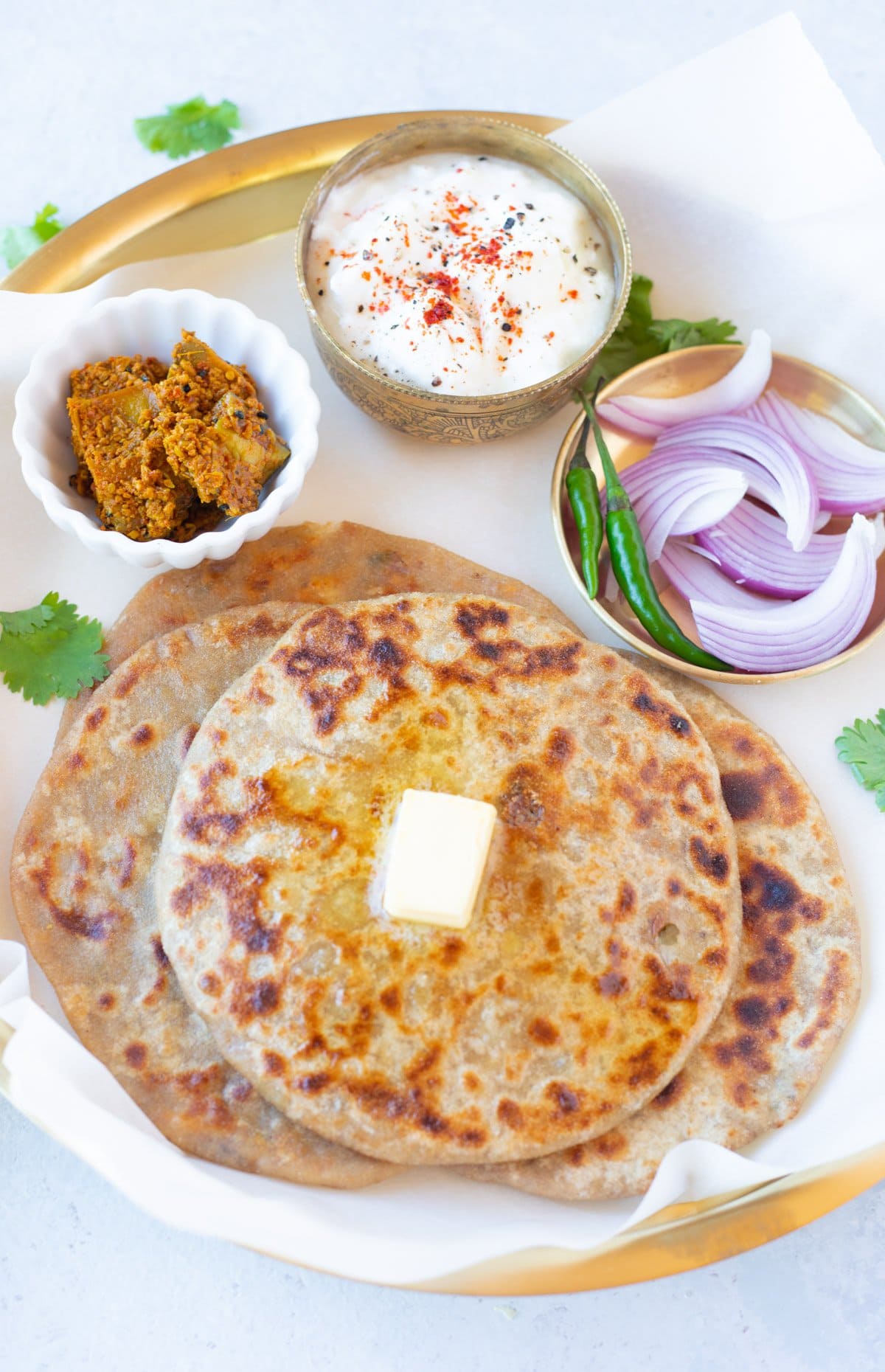
Frozen Aloo parathas are easily available at Indian grocery stores. Some popular brands are Haldiram, Deep, etc. But nothing beats fresh and warm homemade paratha. That’s precisely why I wanted to write this recipe for you.
And if you truly enjoy parathas, you can make your own at home and impress your loved ones with your culinary skills. Here, I shared the basic paratha recipe.
When my mom visited this summer, I learned about all my favorite stuffed parathas I grew up enjoying, such as this aloo paratha, paneer paratha, methi paratha, mooli paratha, and gobi paratha. Now, I also love to make broccoli paratha.
I can assure you your kids will love these parathas. Aloo Paratha is my little one’s favorite to take in her lunch box. I cut them in triangles, like a pizza, which makes it easy for the kids to pick and eat as finger food.
Table of Contents
Watch How to Make Aloo Paratha
What is Aloo Paratha?
It’s a traditional spiced Indian potato flatbread made with boiled potatoes, green chilies, and cilantro. These parathas are traditionally cooked in ghee and served with a big dollop of butter/ Makhan.
In Hindi, ‘Aloo’ means potato, and ‘Paratha’ is an unleavened layered flatbread. So it translates to bread stuffed with boiled and mashed potatoes.
The filling of these aloo parathas has a regional variation, and these parathas are a staple breakfast recipe in North India but are also perfect for weekend brunch. It’s fantastic as a lunch for school. It is simple and quick to prepare!
However, some people have difficulty making perfect aloo parathas because they tend to break and the filling falls out. But you can make the best parathas with this simple recipe and helpful tips! Making these stuffed Indian bread is easy but requires patience and practice.
Ingredients
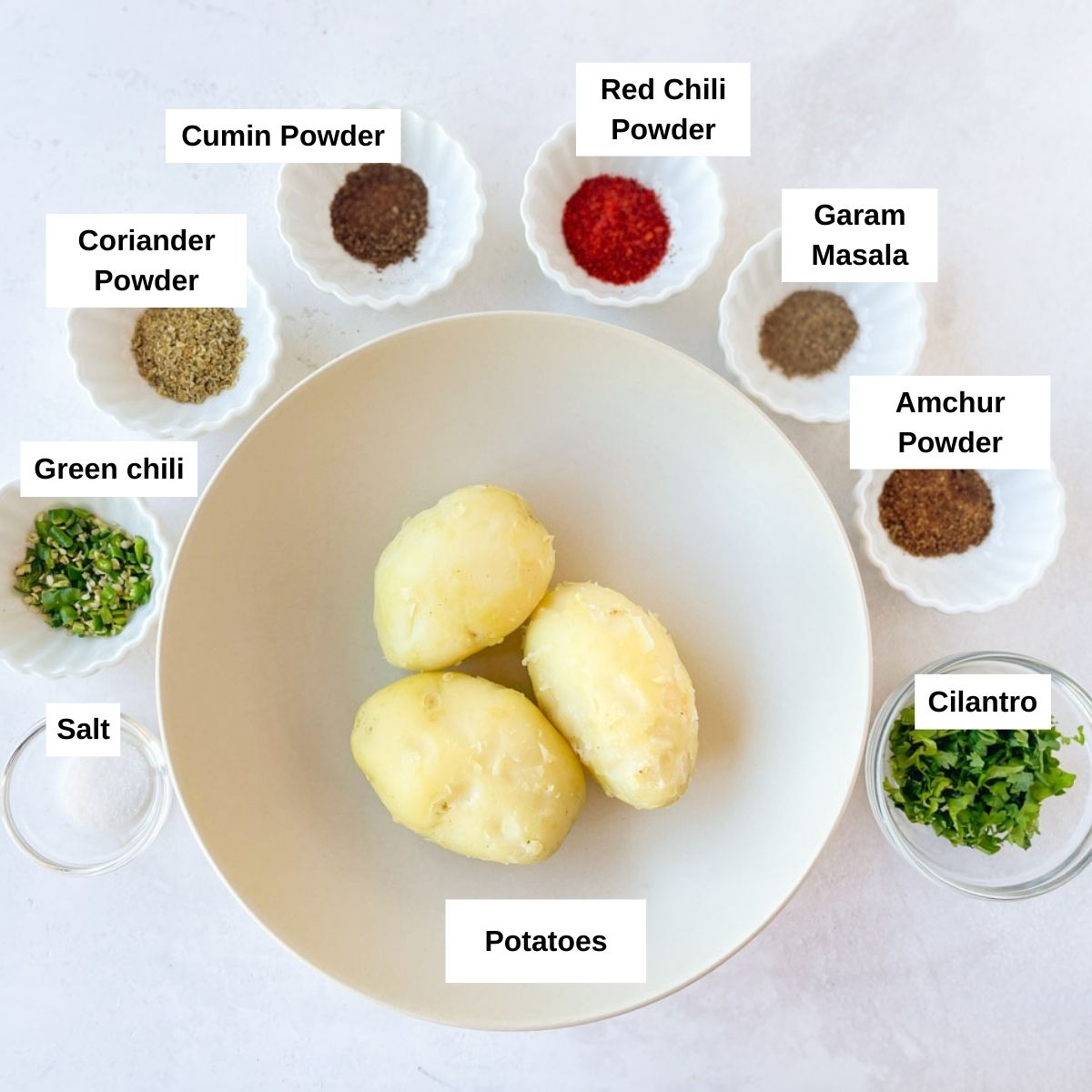
The parathas have two main elements – the dough and the filling or stuffing.
Atta (whole wheat flour): Indian Atta can be easily available at Indian grocery stores. Some brands are Aashirwaad, Sujata Gold, Pilsbury, etc.
Potatoes: This is the star ingredient. I prefer to use russet potatoes to make paratha filling. Make sure you do not overboil them.
Spices: I have used a few spices in this recipe – cumin powder, coriander powder, red chili powder, garam masala, and anardana (pomegranate powder) or amchur powder (dried mango powder).
Herbs: I love to add lots of fresh cilantro and some green chili for the extra punch. Green chili is optional if you can’t tolerate heat.
Oil/ Ghee: For roasting the parathas, it is best to use ghee. However, if you are vegan, use your favorite vegetable oil.
How To Make?
Boil Potatoes
Boil the potatoes without making them mushy. They should be tender when poked with a fork.
a) Cooking in Pan: You can cook the potatoes in a pan covered with water. If using this method, I suggest peeling the potatoes and cutting them into small cubes so they can cook faster than whole potatoes. Drain all the water from the potatoes and set them aside to cool.
b) Cooking in a Pressure Cooker: If you have a regular pressure cooker, cook the potatoes on a medium flame for about 3-4 whistles. The water should be enough to cover the potatoes. Remember to take potatoes of a similar size.
c) Cooking in Instant Pot: This is my go-to method. Pressure cook the potatoes for 5-6 minutes, then let the pressure drop naturally. For more information on this, read my detailed post on instant pot boiled potatoes.
After the potatoes are boiled, let them cool. Later, peel and mash/ grate using a potato masher or box grater until smooth. Make sure there are no lumps/ chunks, as this will break the parathas.
Pro-tip: If you are using potatoes that were boiled a day before, then I highly recommend grating them. This will make sure there are no lumps.
Make The Stuffing
Take the mashed potato. Add chopped green chilies and cilantro. Then add the spices and salt. Then combine everything well.
Taste the stuffing and adjust spices or salt as needed.
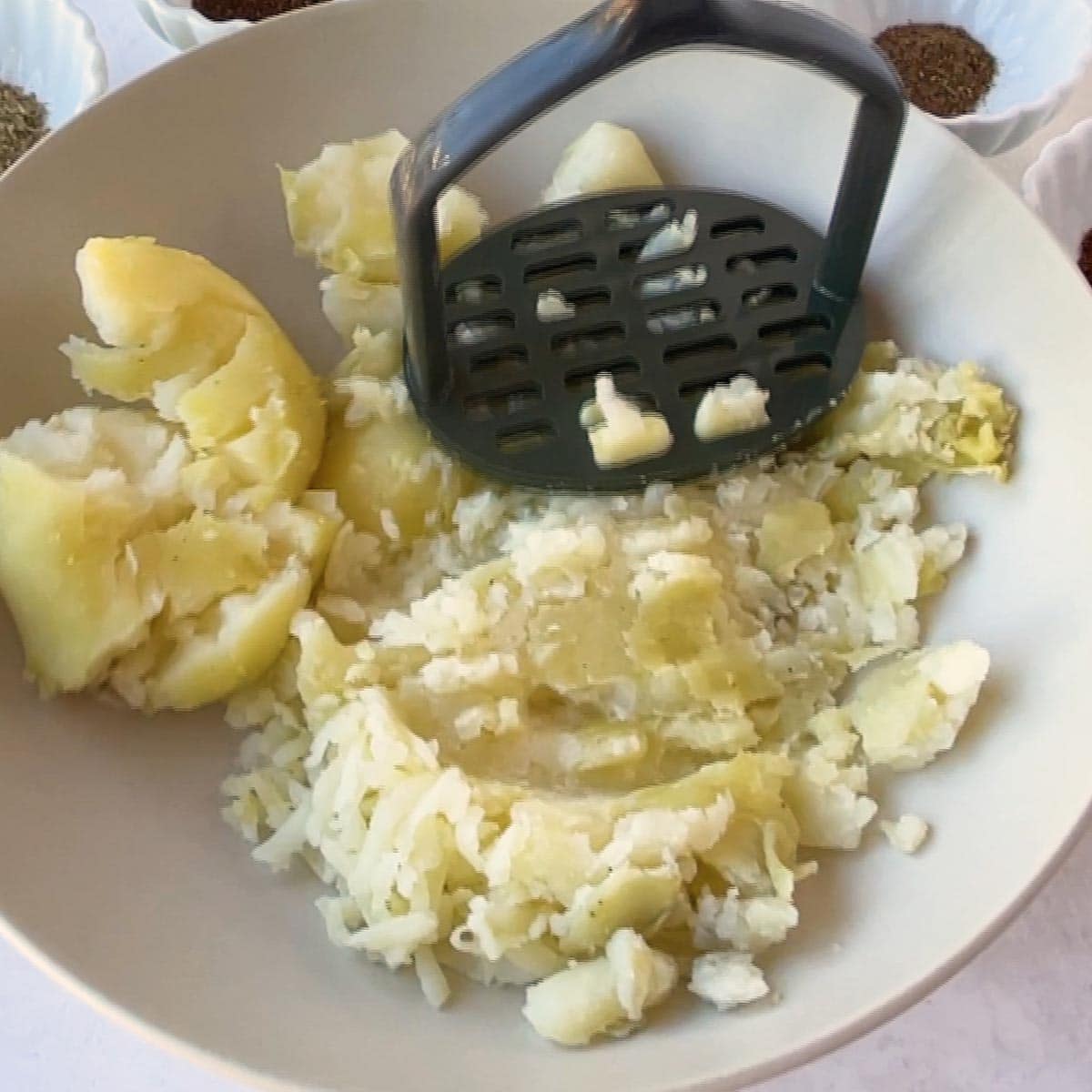
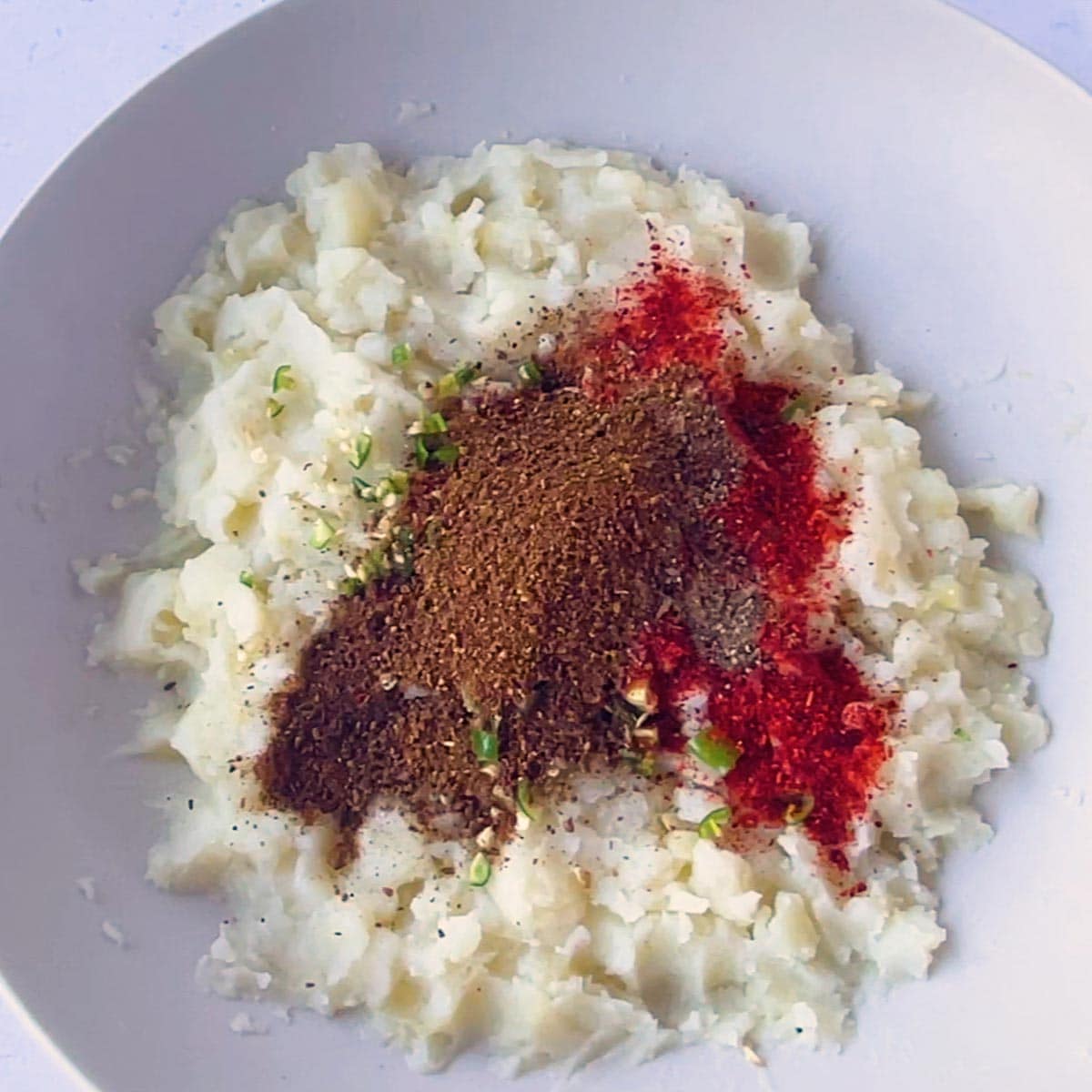
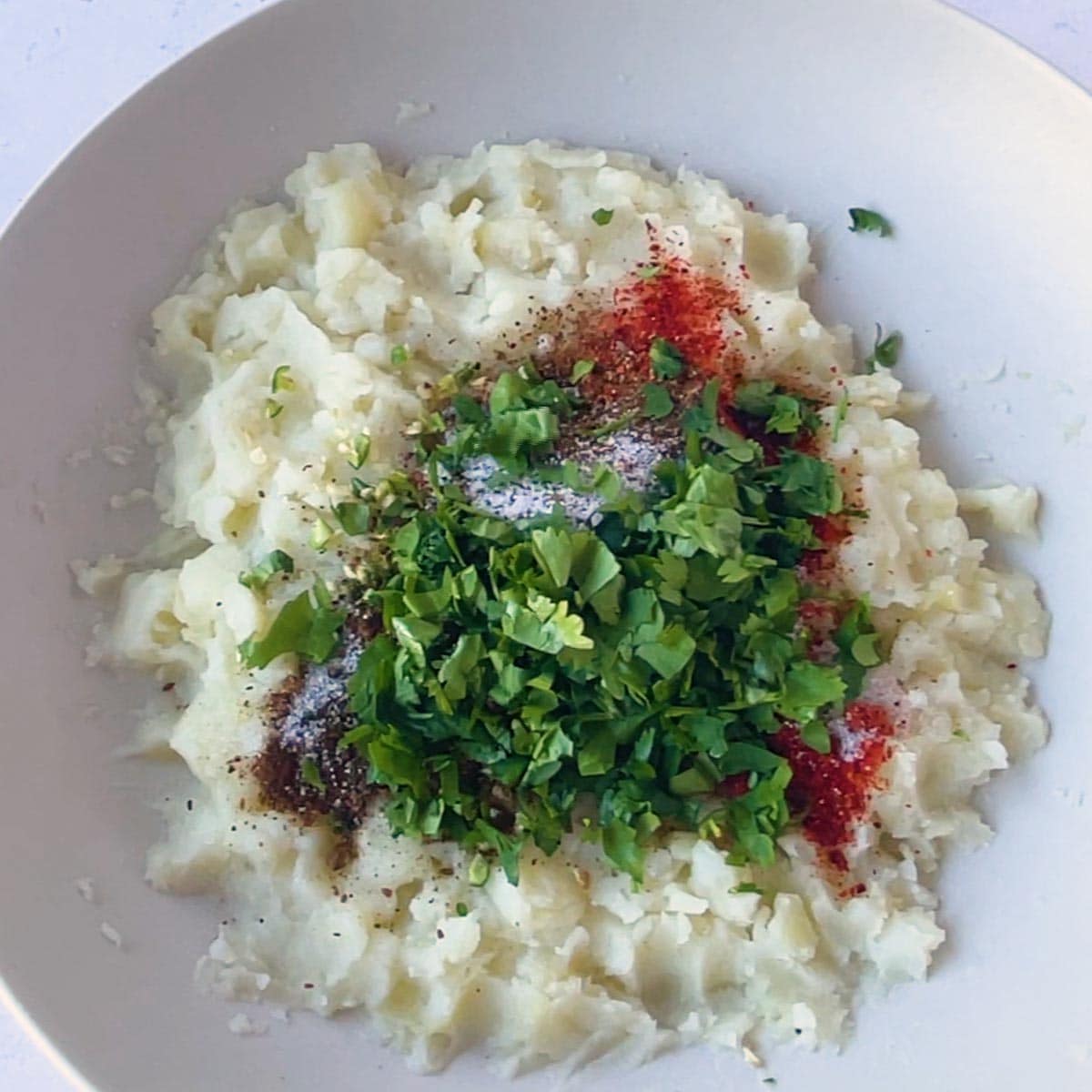
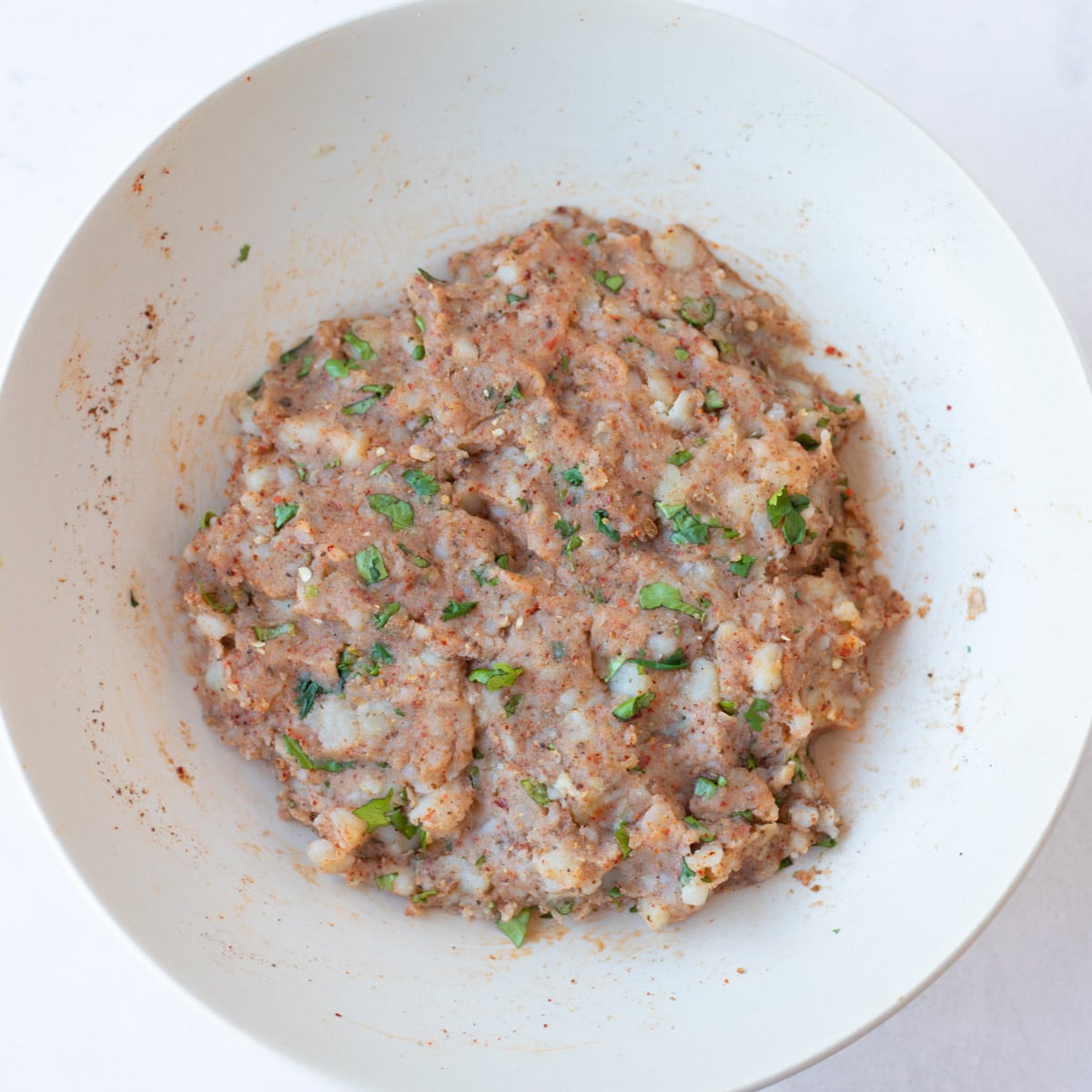
Make The Dough
I use whole wheat flour for the dough, but you can use a combination of whole wheat flour and all-purpose flour if you like flakier parathas.
If you are familiar with the roti/chapati-making process, the dough for parathas is pretty similar. You can also use a stand mixer to make the dough.
In a wide bowl, take 2 cups of whole wheat flour, a.k.a ‘Atta’ in Hindi. Make a well in the center. Add ½ teaspoon salt (or to taste), one tablespoon oil or ghee, and roughly ⅓ to ½ cup water.
When mixing and kneading the dough, add the water in small amounts. Do not pour the water all at once; otherwise, you will get a slushy mess.
Bring the ingredients together and knead for 8-10 minutes to form a smooth, soft dough. If necessary, add more water. Cover with a damp cloth and set aside the dough for around 20-30 minutes to rest.
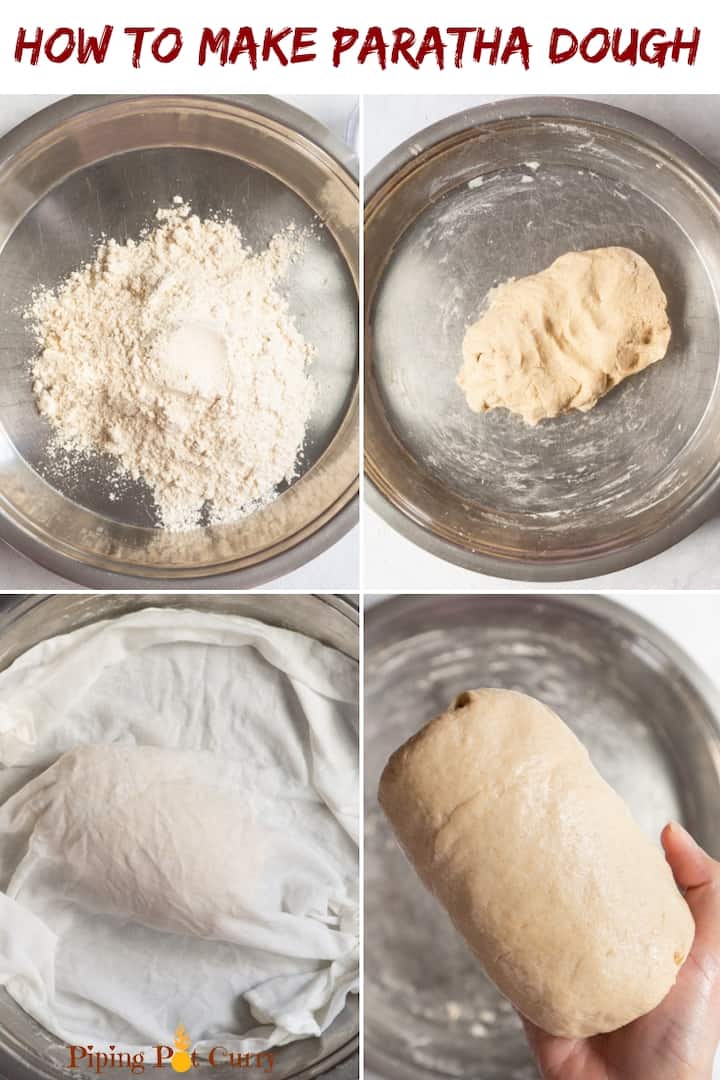
Roll The Paratha
This is the most important step in making stuffed parathas and can be a little intimidating initially. This requires some practice. But once you get the hang of it, it’s easier!
There are broadly two ways to do this:
Disc/ Roti Method: This method involves rolling two roti/ chapatis of around 6 inches each. Read my post on how to make roti here. Spread the potato filling on one roti. Slightly wet the edges with water. Place the second roti on top of the filling and gently press the edges to seal them. And then you can roll it further, dusting some wheat flour if you want it thinner.
Dumpling Method: I prefer this method. Take a medium-sized dough ball. Roll it and then flatten it lightly with the help of your palms. Roll out a roti of about 5 inches in diameter, dusting it with flour.
Next, optionally spread some ghee on the rolled dough. I like to do this, especially when making parathas for kids.
Next, scoop out some potato stuffing, make a ball, and place it in the center, leaving about 1 inch of space from the sides.
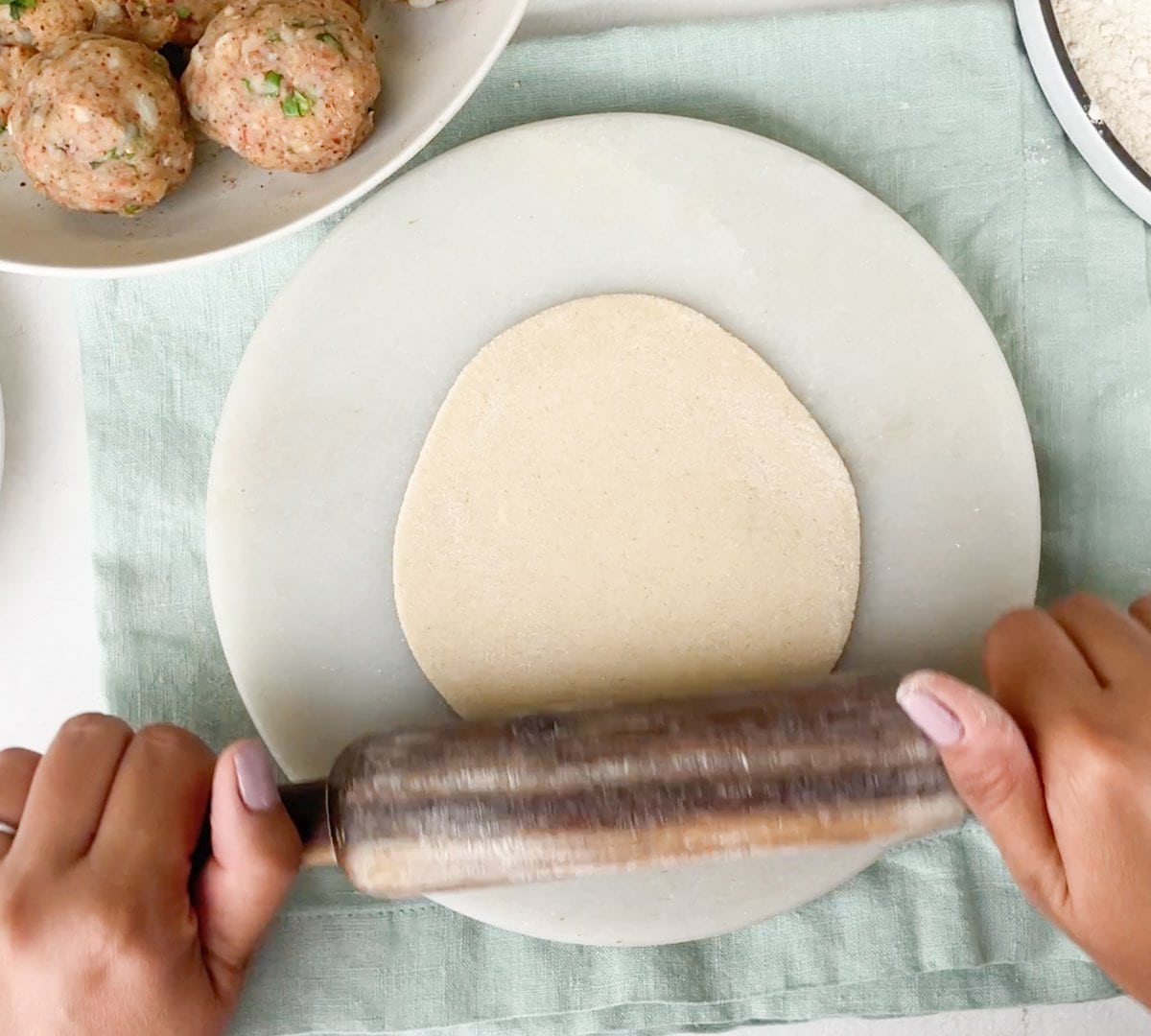
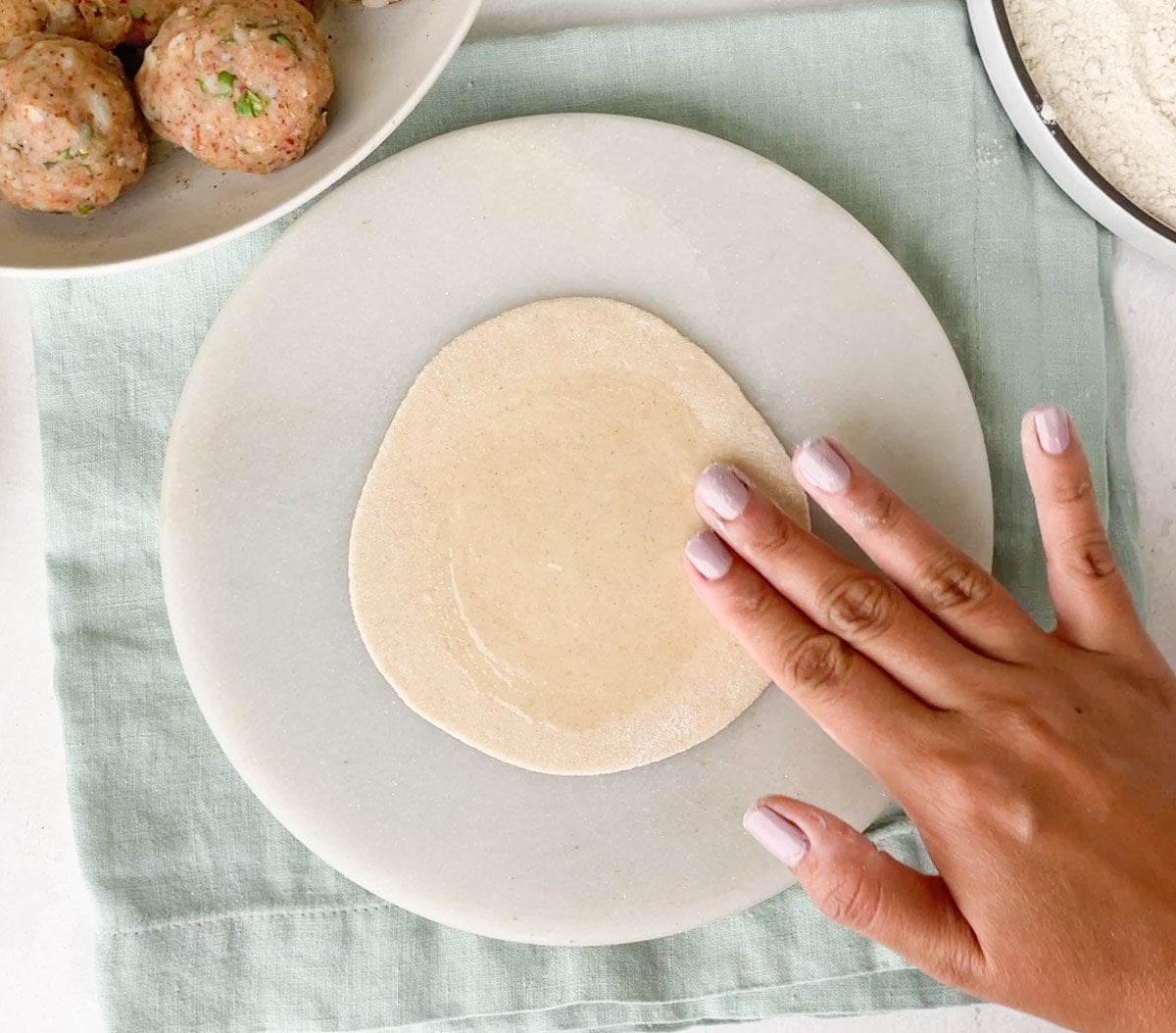
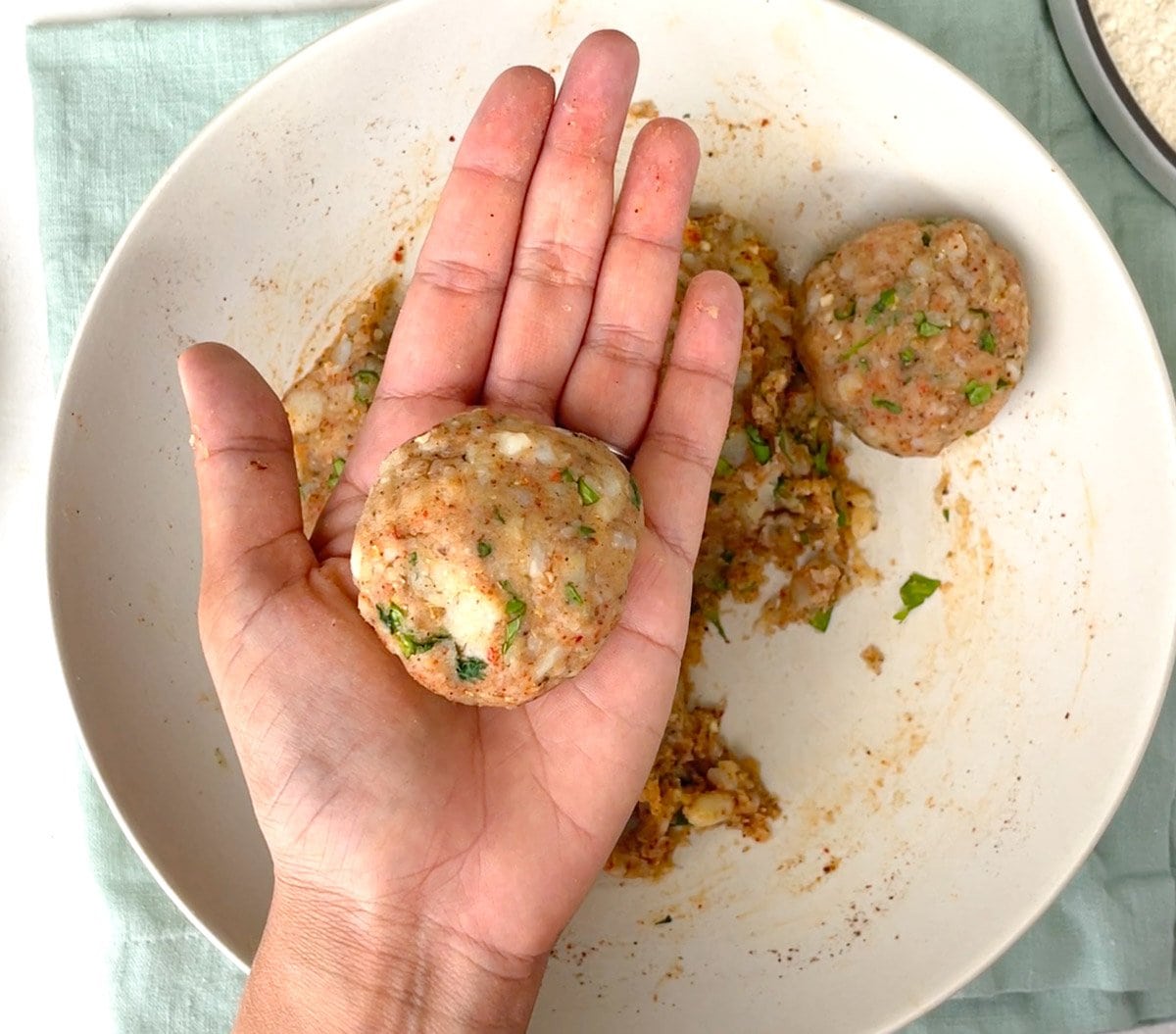
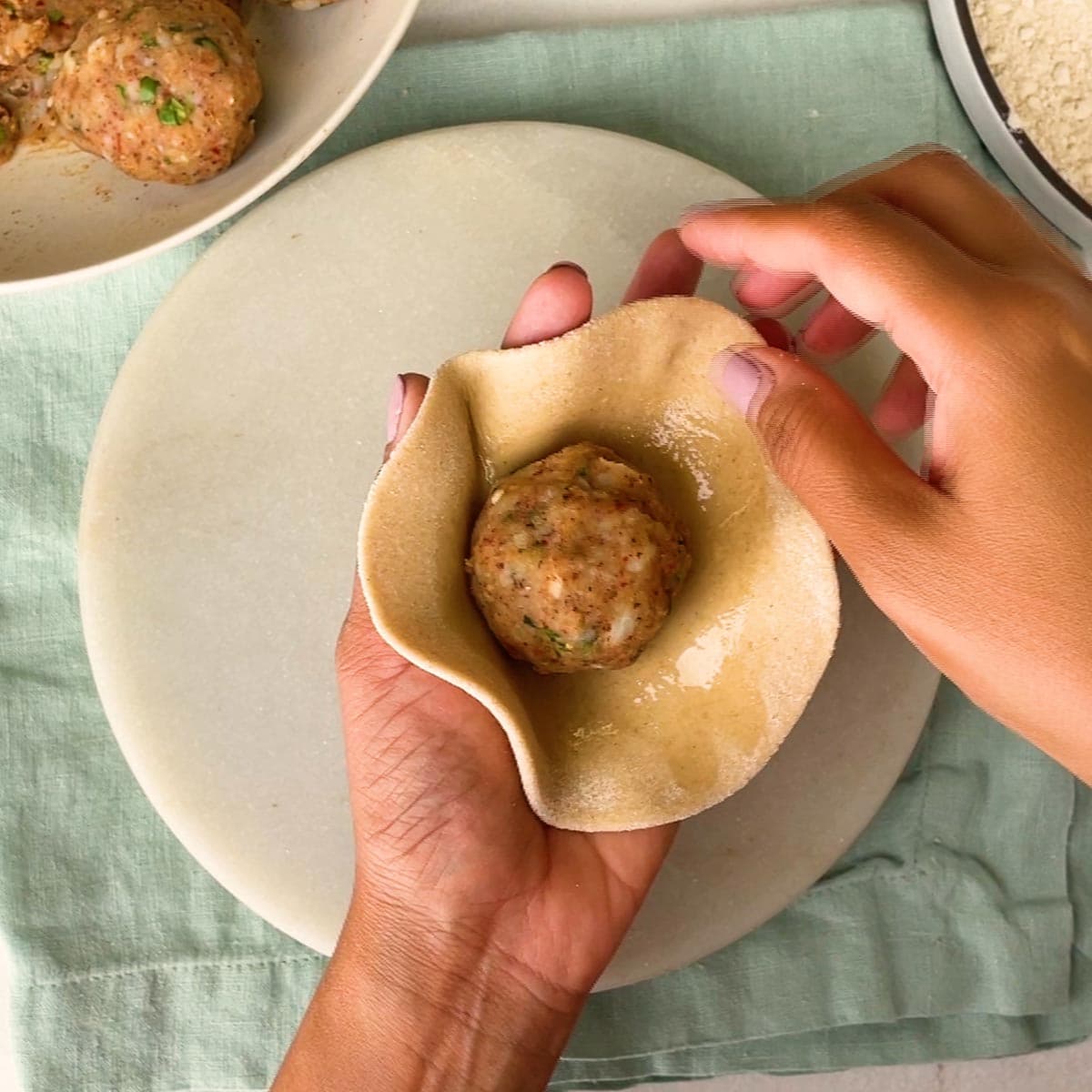
Take the edge, make small pleats, and gather the pleats to join in the center. When the pleating is complete, the stuffing will not be visible and look like a dumpling.
Here is a pro tip: Sometimes you have parathas that have thicker dough at the center. To avoid that, you can remove any extra dough at the top of the dumpling. This makes sure that the filling spreads evenly throughout the paratha.
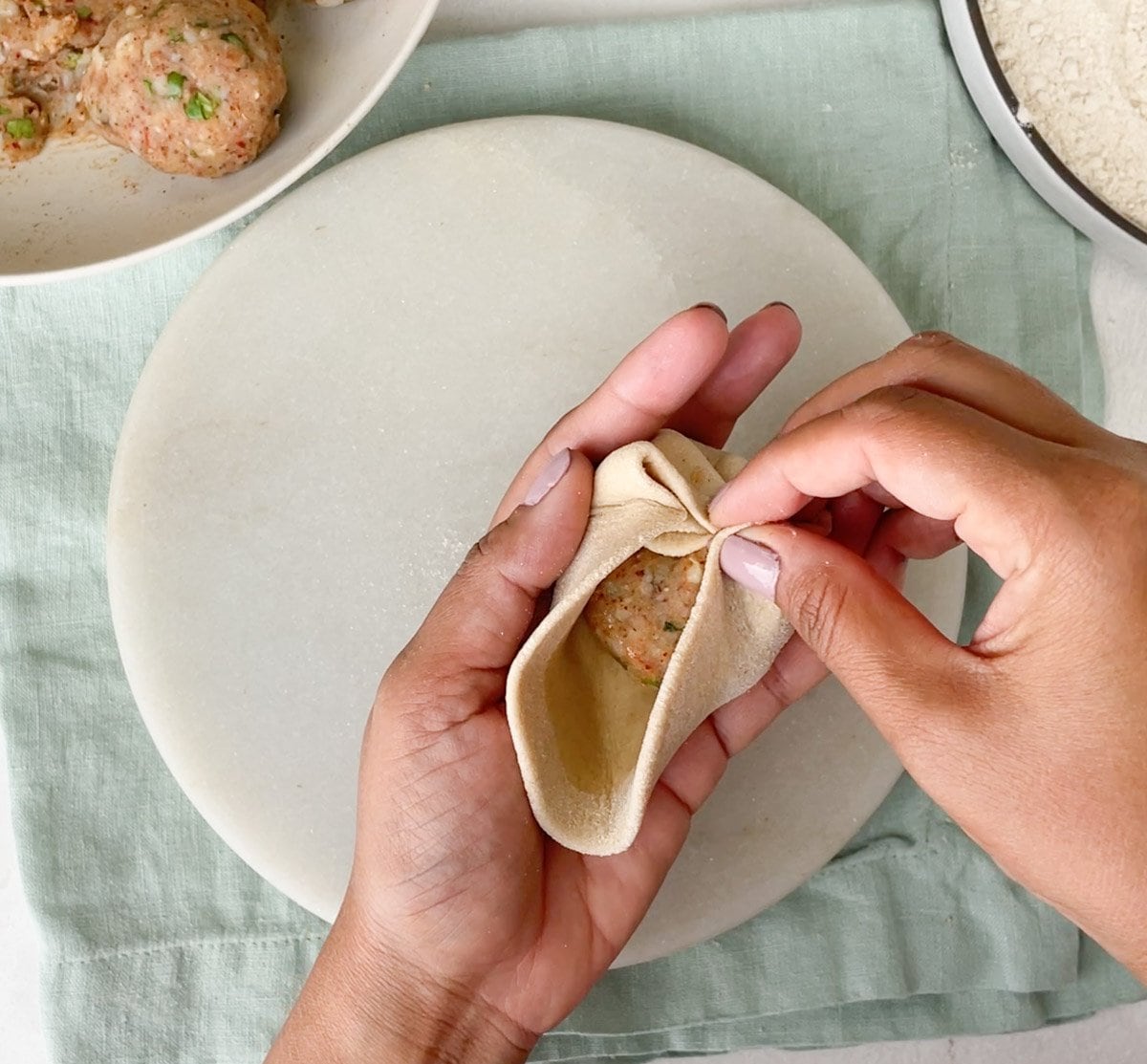
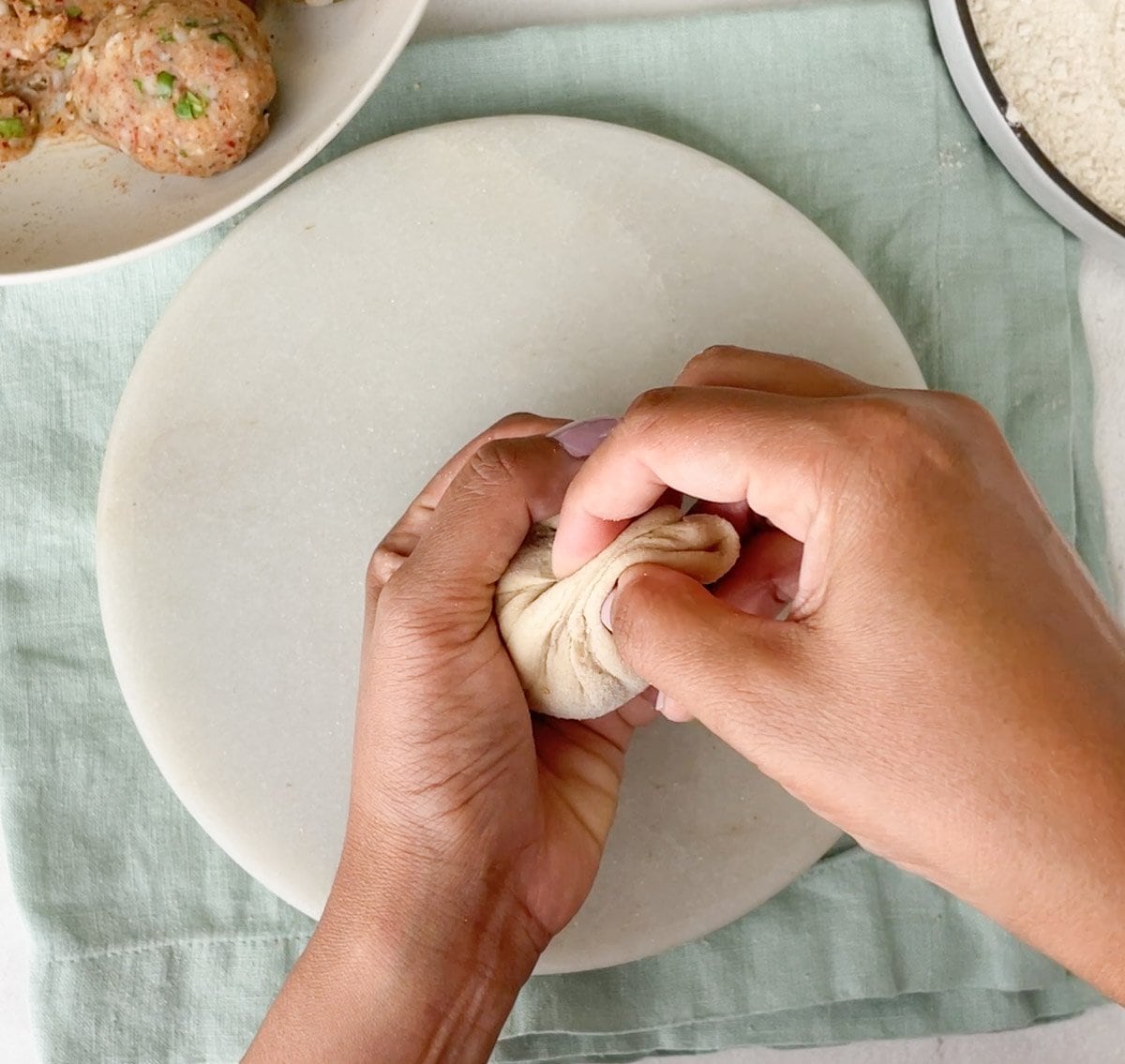
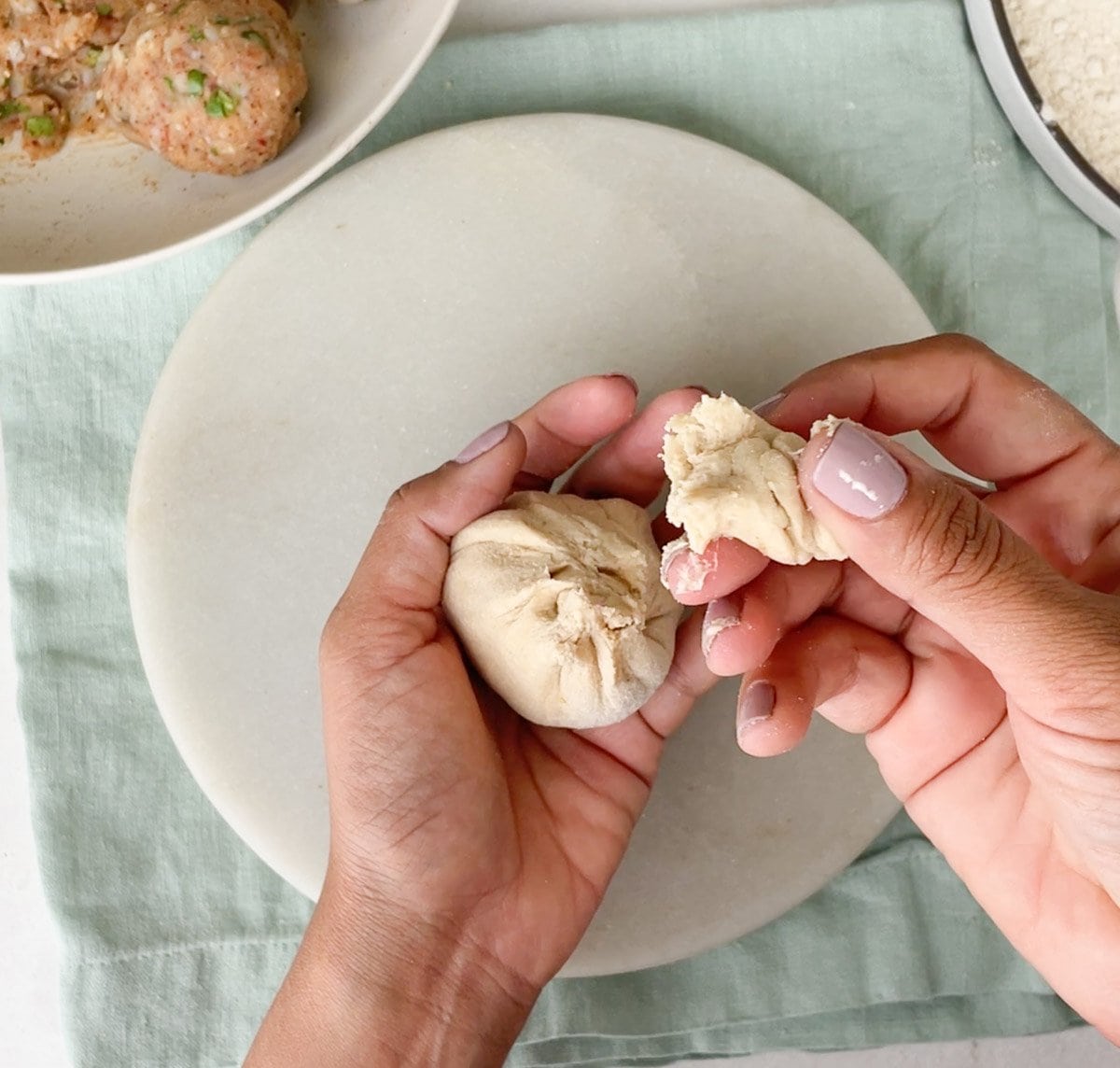
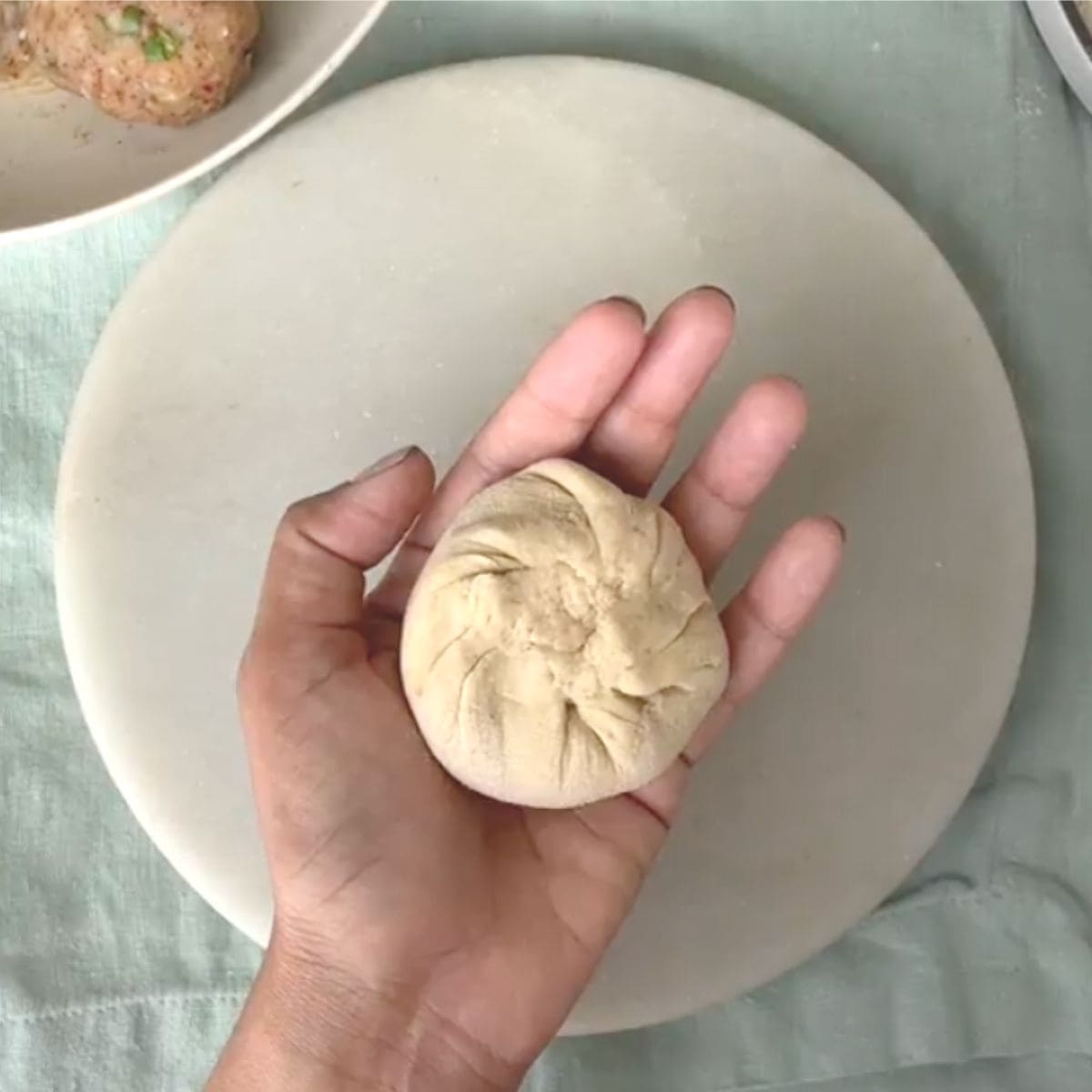
Next, flatten this dumpling in the center, dust it in dry flour, and roll it. If, by chance, any filling comes out, cover the torn end with a small piece of dough. Keep rolling the dough like a pie crust, trying to maintain the same thickness throughout. It is important to roll with gentle hands. Make sure the edges are not very thick.
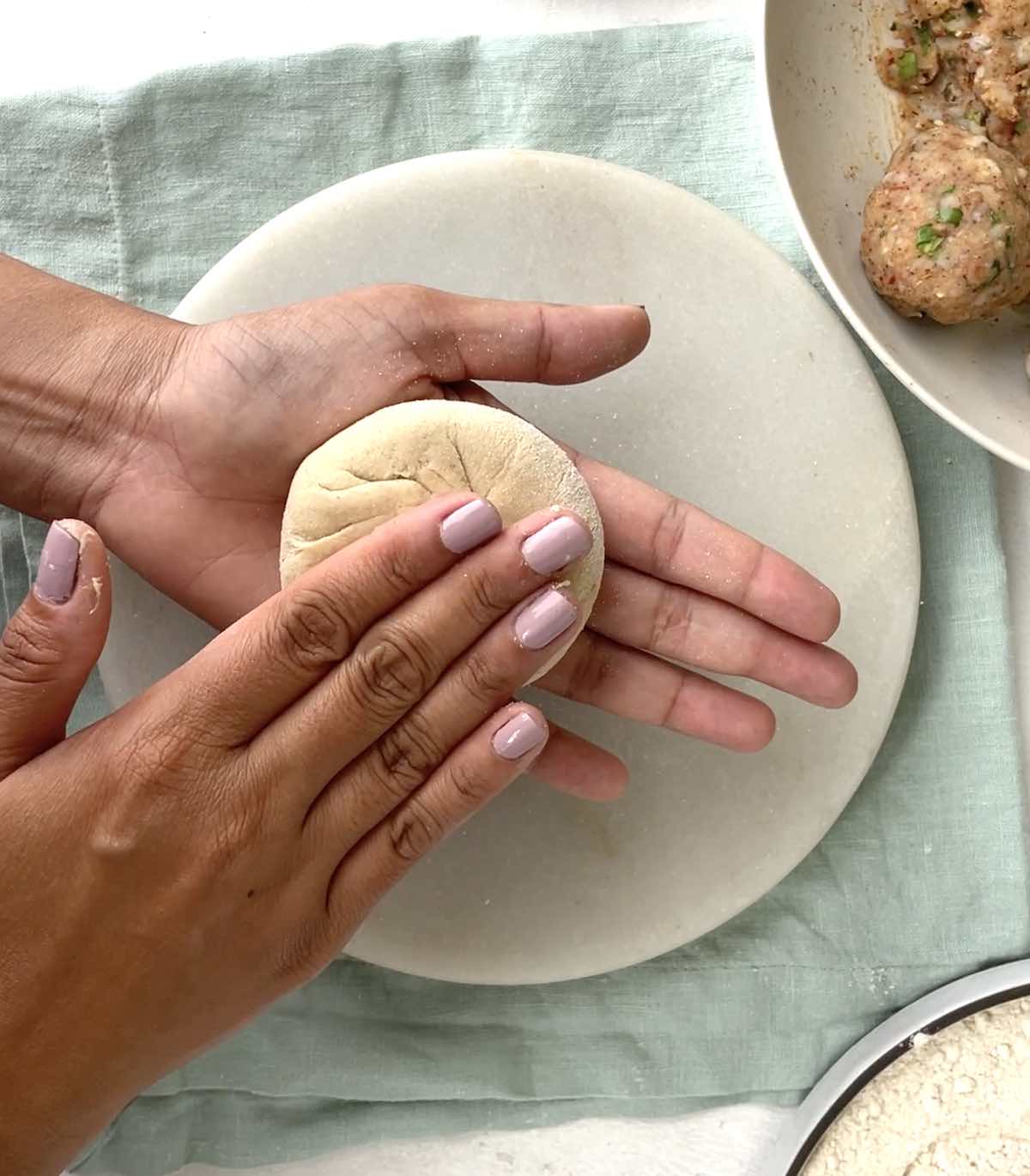
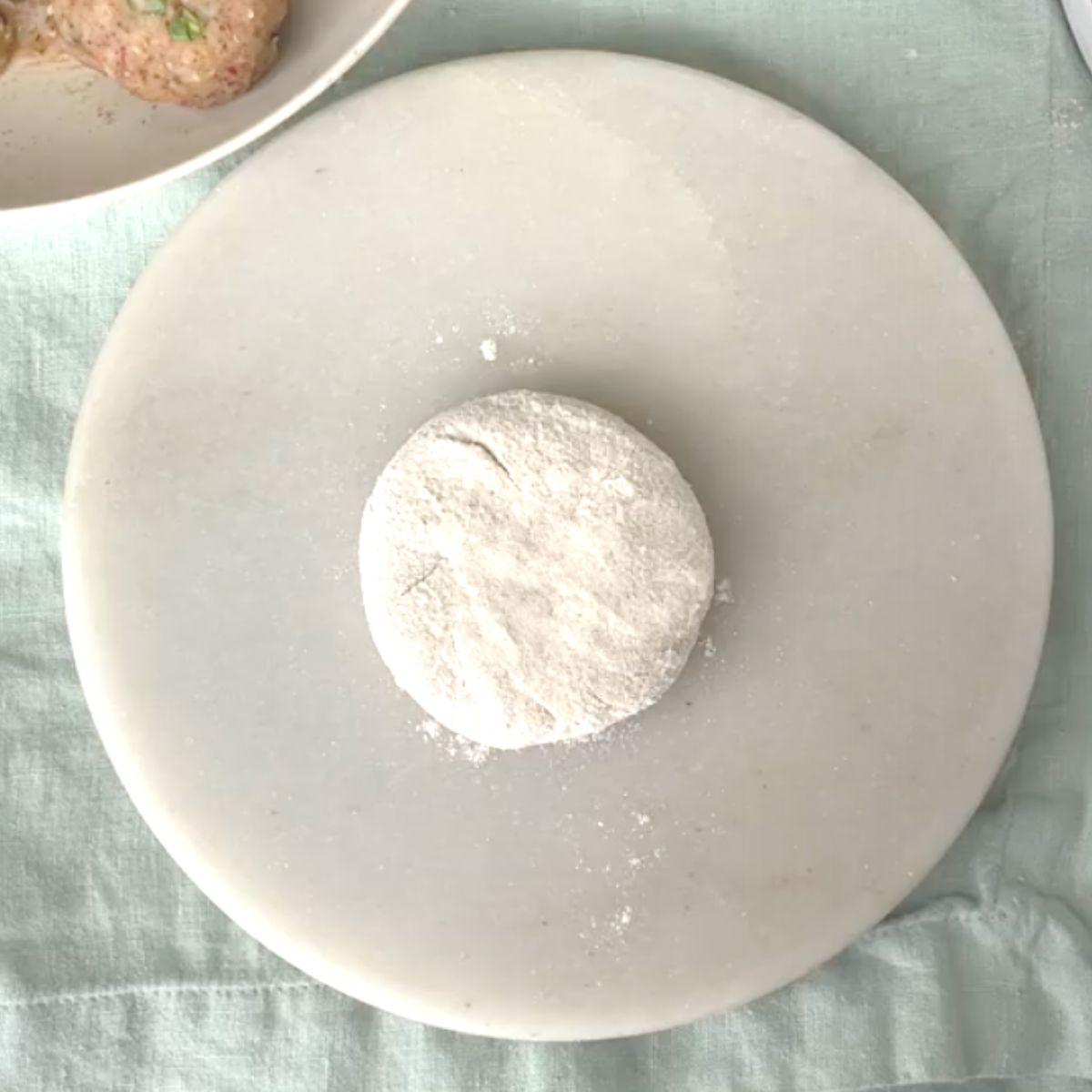
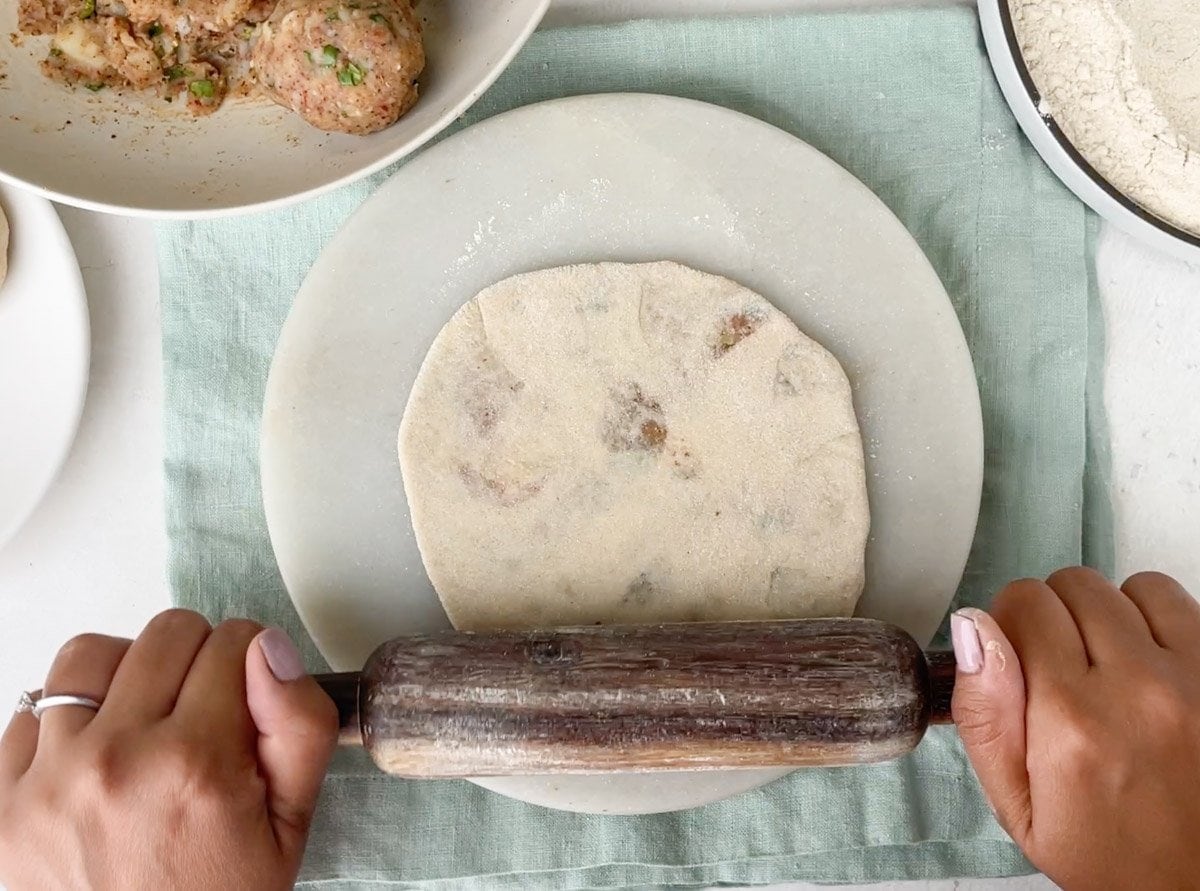
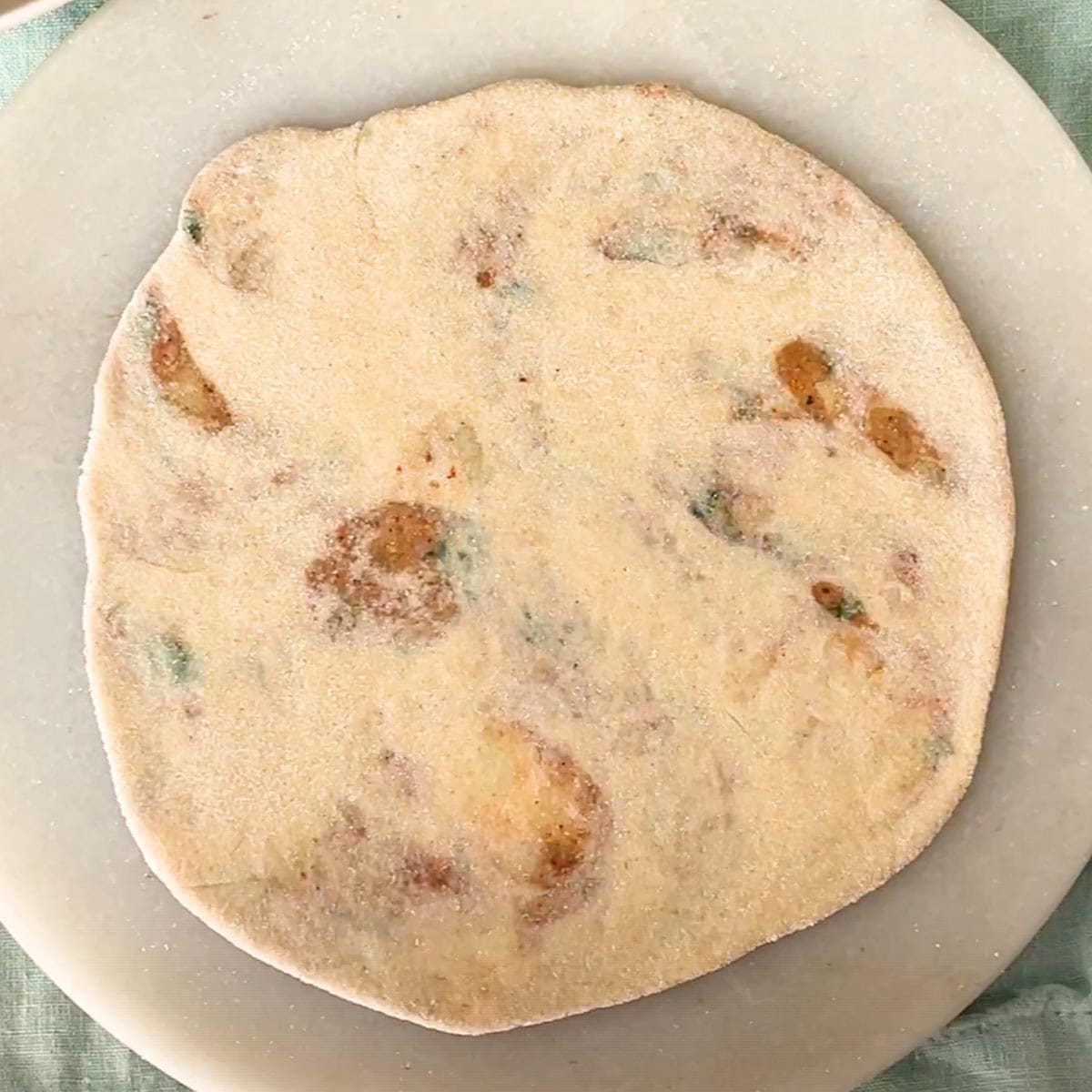
Roast The Paratha
Heat the tawa (skillet or griddle). Place the rolled paratha on the hot tawa. Ensure not to cook parathas on a low flame as they will be hard. Adjust the flame according to the thickness of the tawa. The finished parathas should be crispy and soft at the same time.
Use a spatula to flip the paratha once the base is partially cooked. You’ll notice air pockets on the top, and the paratha puffs up.
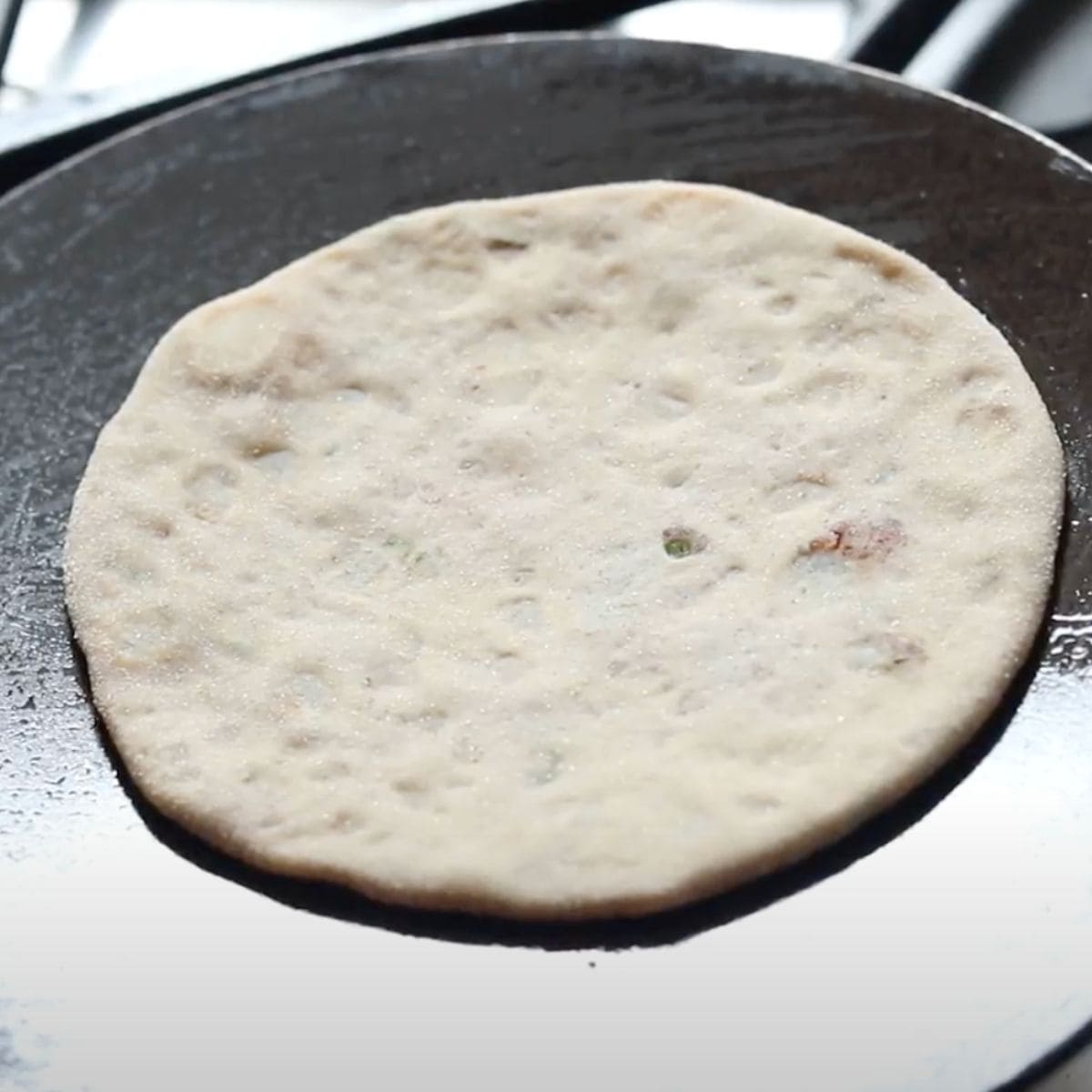
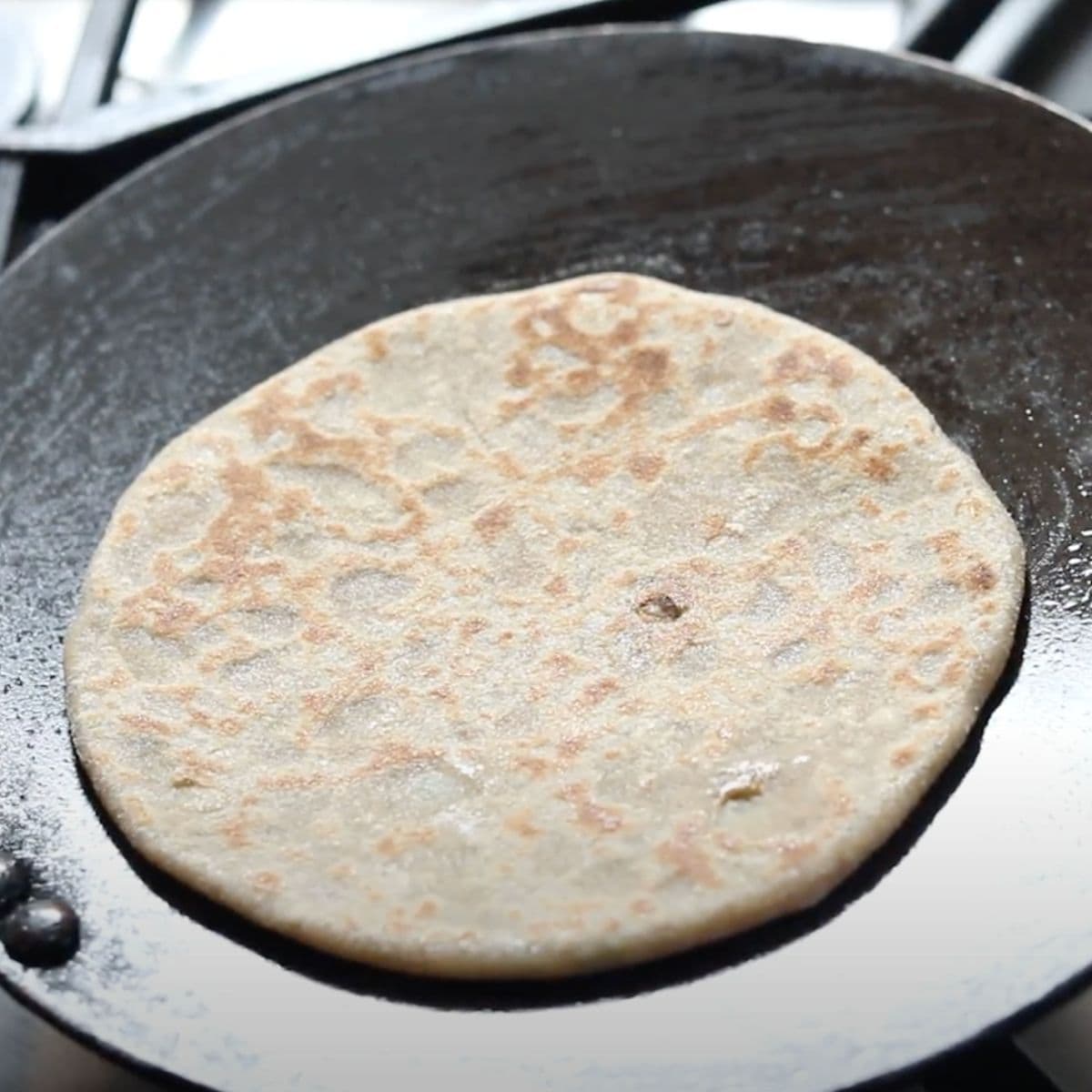
Spread or brush your choice’s ghee or vegetable oil on the partially cooked side.
Flip it over again, and you’ll see brownish/ golden spots on the surface. To be more specific, the ghee/ oil-slathered side will now be on the bottom.
Spread ghee/ oil on the second side and press the edges of the paratha till it is evenly brown and well cooked.
Repeat these steps till all the parathas are cooked.
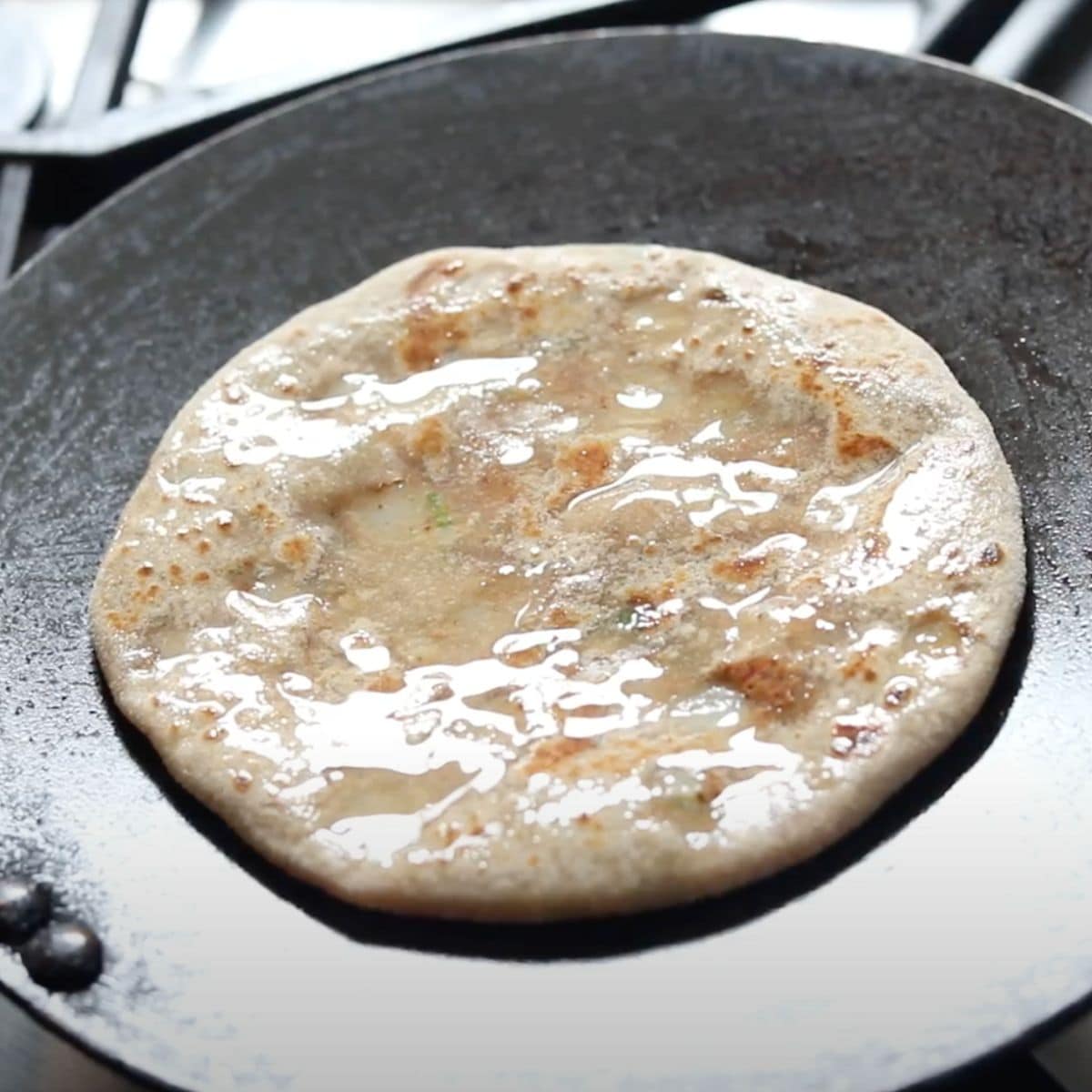
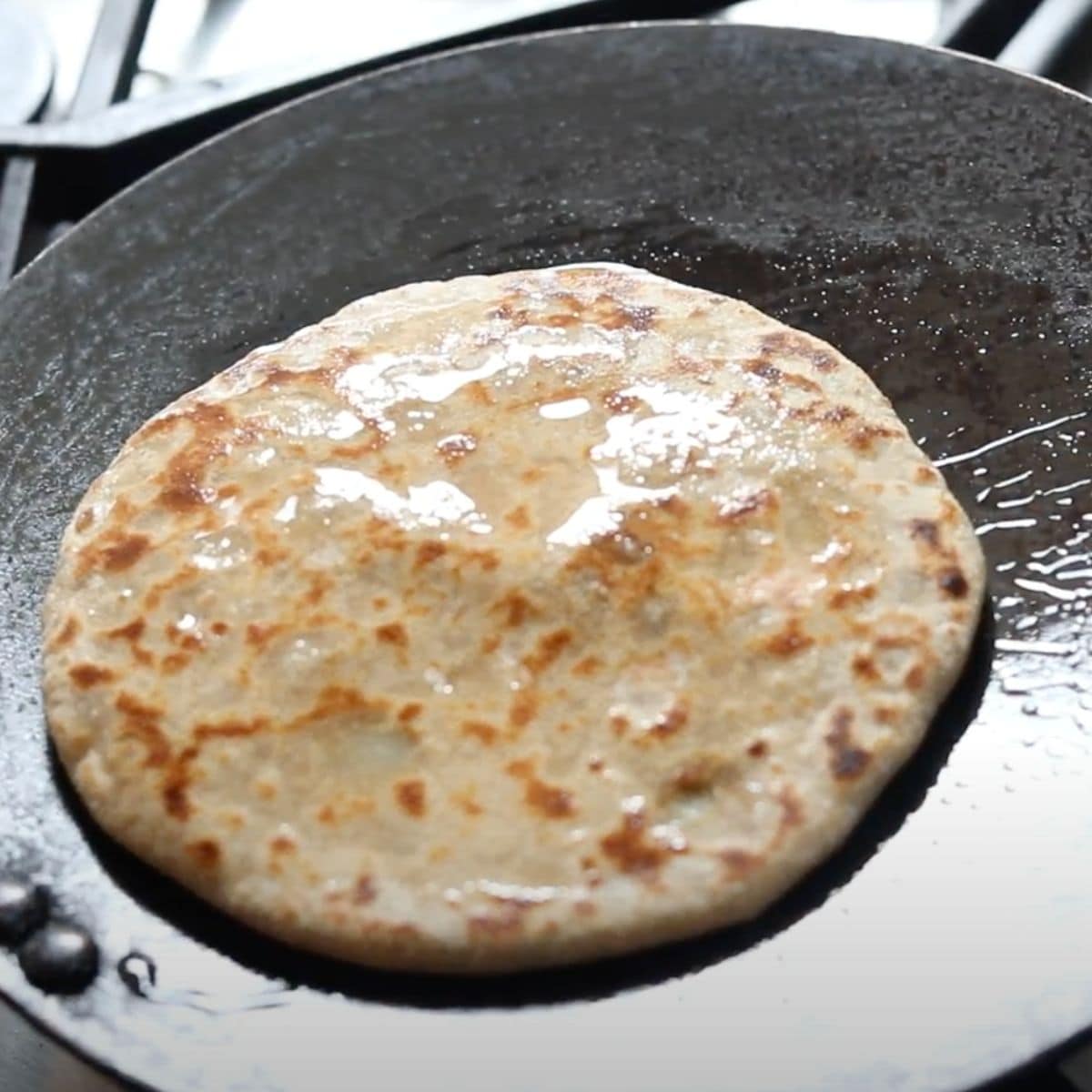
Take it off the tawa and keep it on a plate lined with a paper towel.
You can also store it in an insulated container or a roti basket wrapped in a towel. This will ensure they stay warm when you are ready to eat.
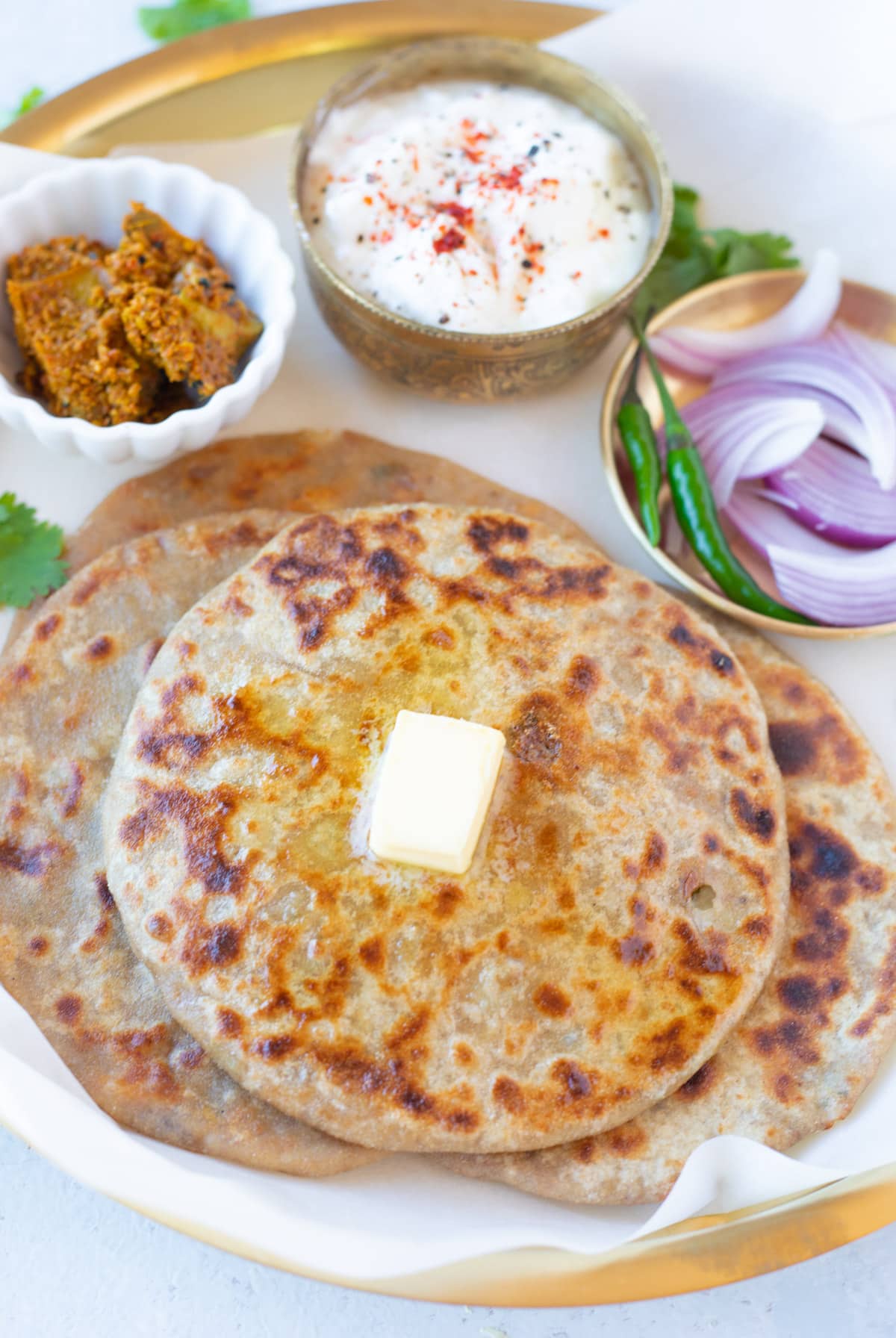
Pro-tips
- Cook the potatoes until they are tender. Avoid overcooking them.
- Let the boiled potatoes cool completely before making the filling. You can refrigerate them for a couple of hours to keep them dry to ensure parathas do not tear during rolling.
- Mashing the potatoes thoroughly is key! Any large pieces can tear the paratha. Use a grater or fork to mash the potatoes smoothly.
- Knead the dough thoroughly until soft and smooth, and let it rest.
- I know it’s tempting, but avoid overstuffing the parathas as the filling will come out.
- The griddle/ tawa has to be hot enough for the parathas to be soft and crispy.
- It’s best to cook the parathas over medium-high heat. Cooking on low heat will not produce crispy parathas.
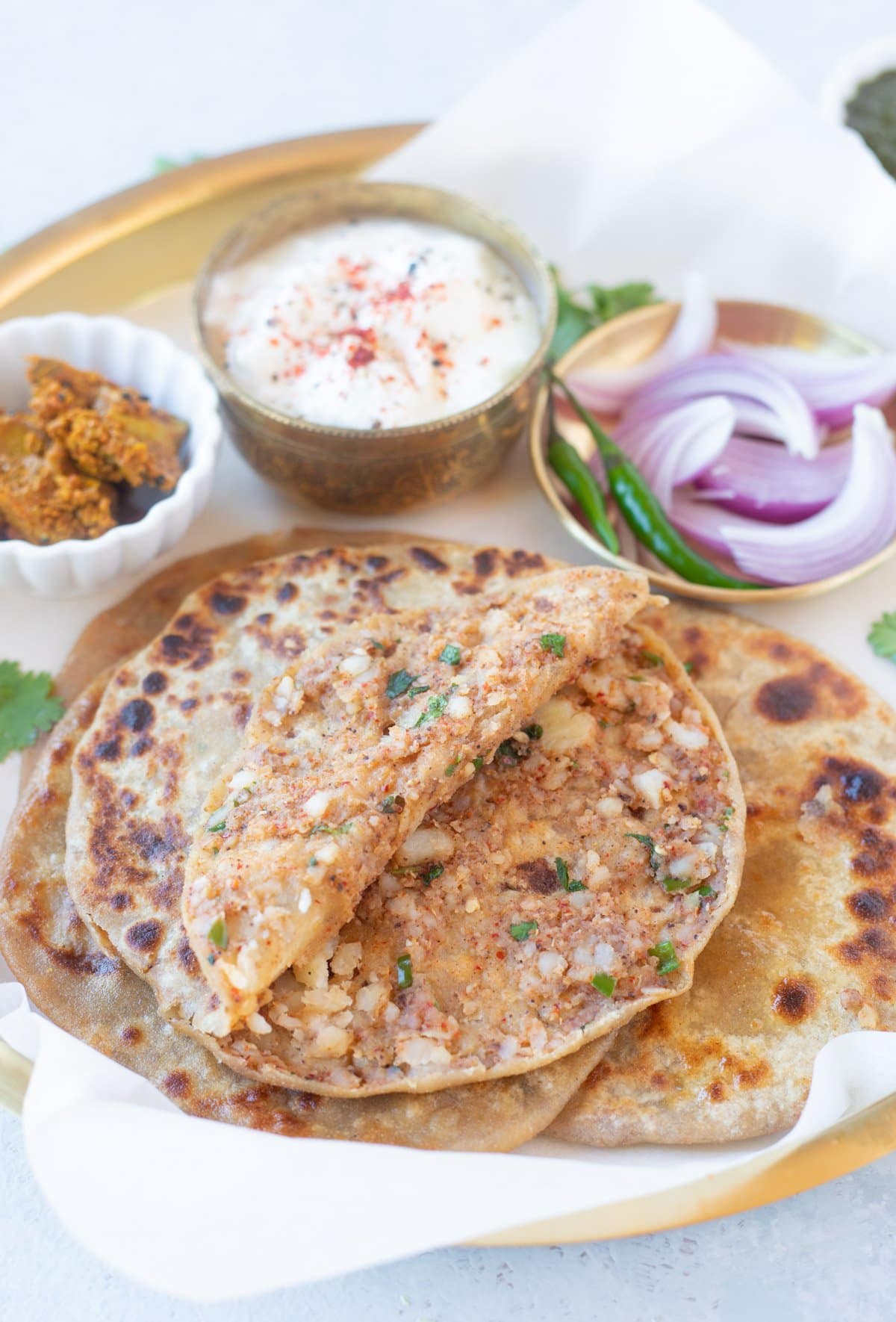
Variations
Potato-Paneer Paratha – Add grated paneer to the potato filling. This is an all-time favorite in our house!
Potato-Peas Paratha – boiled and mashed green peas mixed along with potatoes – almost tastes like samosa 🙂
Potato-Spinach Paratha – Add finely chopped spinach to the potato mixture. You can use kale or methi leaves instead as well.
Potato-Onion Paratha: This is another awesome option. Add finely chopped red onion to the potato mixture.
Potato-cheese Paratha: My kids love this one. Add grated mozzarella or cheddar cheese to the potato filling, similar to this cheese paratha.
Potato-Cauliflower Paratha: Do you love Aloo gobi? Make a stuffed paratha with leftover sabzi or add some finely chopped cauliflower to the potato and enjoy.
How to serve?
Aloo ka paratha tastes best on its own when served hot straight from the tawa.
In the Indian state of Punjab, it is traditionally eaten with a dollop of freshly made homemade butter and sweet lassi.
But the usual pairings for the paratha are plain yogurt or raitas like boondi raita, cucumber raita, etc.
Parathas taste great with chutneys and pickles – mint cilantro chutney, Apricot Chutney, ginger chili pickle, mango pickle, lime pickle, etc., are my favorite go-to options.
Aloo parathas with chana masala or dal makhani make a wonderful combination.
Some people have it with a hot cup of masala chai.
Common Questions
Certainly, you can make the dough in any food processor, stand mixer, or Kitchen Aid as long as you have the dough attachment/paddle. It is super easy to make parathas if your dough is ready in a jiffy. All you have to do is add the whole wheat, salt, oil, and water to the mixing bowl. Add water as required, and let the appliance run until you get a smooth and pliable dough. Read my post on how to make dough using a stand mixer.
I suggest you make the parathas fresh right before you want to eat them and serve them straight from the griddle/tawa. But you can prep and make the dough and potato stuffing and store it in an air-tight container in the refrigerator.
If you want to cook ahead of time, say for a dinner get-together, you can semi-cook (half done) the parathas without the oil. You can cool and store them in parchment paper and foil and refrigerate them for a couple of days. And when ready to serve, heat them and finish with ghee/oil.
If you want to freeze them, cook the parathas till half done without any oil. Cool them, place a parchment paper between each paratha, and make a stack of 5-6 parathas. These stacks can easily be stored in a freezer-safe bag or an airtight container and frozen for around 3-4 weeks.
When you want to eat, take out the frozen paratha and cook it on a hot griddle using oil/ ghee until both sides are perfectly golden brown.
Kids love aloo paratha in their lunch boxes. Let the paratha come to room temperature. This helps not to make the paratha soggy once packed.
Cut them into triangles (similar to a pizza), and little kids can easily pick them and enjoy as finger food. 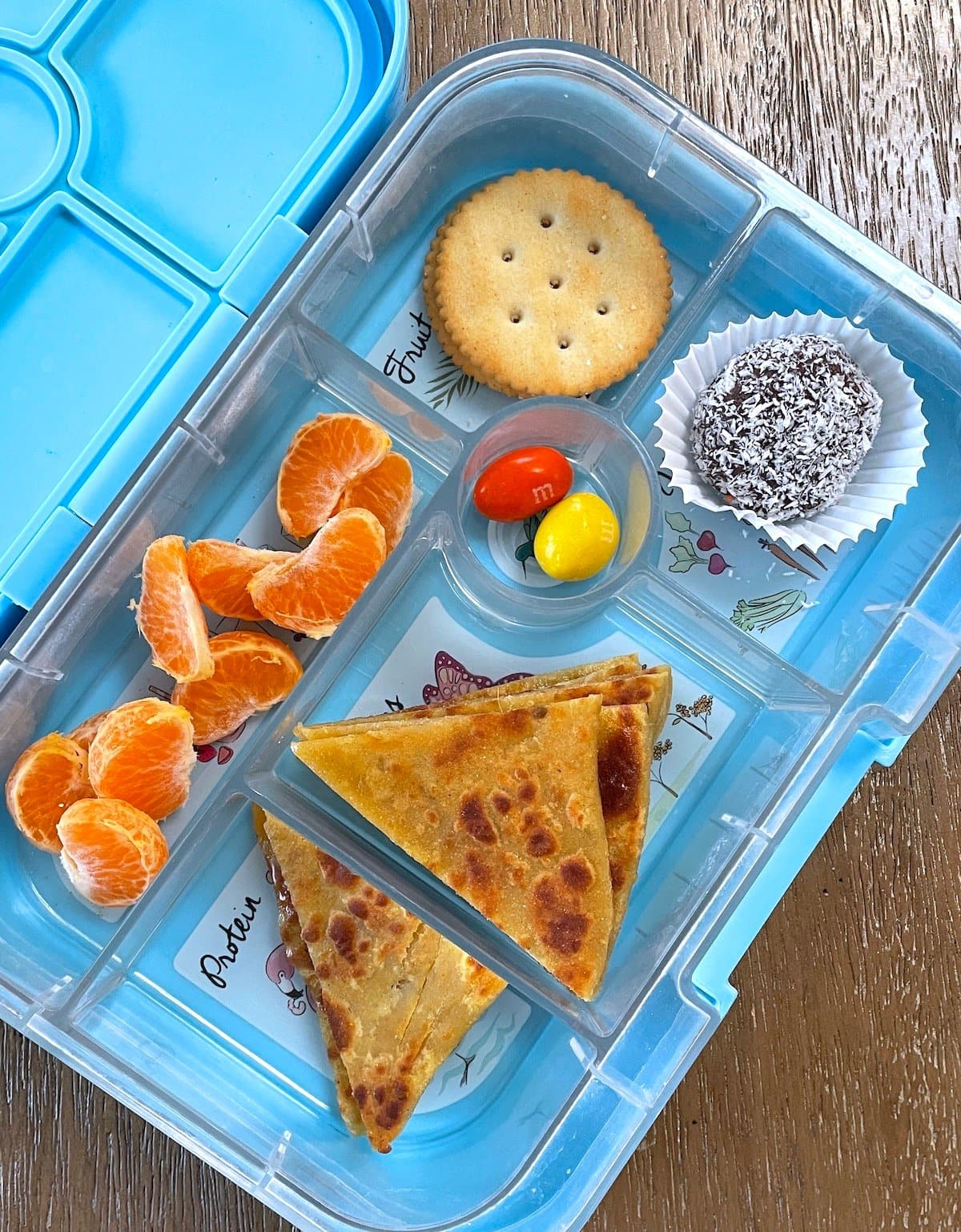
Here are a few favorites recipes that you might like:
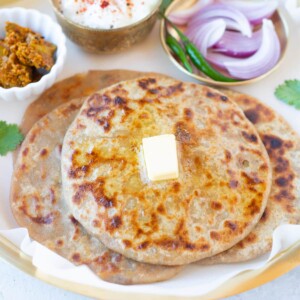
Aloo Paratha
Video
Ingredients
For the Dough
- 2 cups Whole Wheat Flour, use indian style aata
- 1/2 teaspoon Salt, optional
- 1 teaspoon Oil , plus more for roasting parathas
- 3/4 cup Water, plus few tablespoons more as required
For the Potato Filling
- 3 Potatoes, medium
- 2 Green Chili Pepper, finely chopped, optional
- 1 teaspoon Coriander powder (Dhaniya powder)
- 1/2 teaspoon Cumin Powder
- 1 teaspoon Red Chilli Powder, adjust to taste
- 1/4 teaspoon Garam Masala, optional
- 1/2 teaspoon Pomegranate powder (Anardana), or Amchur Powder (dry mango powder)
- 1 teaspoon Salt, adjust to taste
- 3 tablespoons Cilantro, finely chopped
To pan fry
- 4 tablespoons Ghee, can also use oil
Instructions
Make the Potato Filling/ stuffing
- Boil the potatoes first, and prepare the dough while they are boiling. In a stovetop pressure cooker, cook for 4-5 whistles. In an instant pot, pressure cook for 12-18 minutes depending on size of potatoes. Remove potatoes from pressure cooker, and let them cool a bit. Then peel the potatoes.
- Cut the potatoes roughly and mash them with a potato masher in a bowl. You can also grate them (I recommend this for potatoes that were pre-boiled and stored). Make sure there are no lumps.
- Add the finely chopped green chillies and cilantro. Add all the spices – coriander powder, cumin powder, red chilli powder, garam masala, pomegranate (or amchur) powder and salt. Combine everything and make a smooth mixture. Taste and adjust salt or spices if required.
Make the Dough
- In a large bowl, combine atta (whole wheat flour), 1 teaspoon oil and salt.
- Add enough water (in small increments) and knead to make a soft and smooth dough. Make the dough smooth by kneading it with your fist. Add some water to your hand and knead 2-3 times. When you press your finger against the dough, it should leave an impression. This is the right consistency of the dough.
- Cover with a damp cloth or plastic wrap and let the dough rest for at least 15 mins and up to 30 mins while you prepare the filling.
Rolling
- Take a medium-sized dough ball (weight 55-60 grams). With the help of your palms, roll it and then lightly flatten it lightly. Dust the dough ball with dry flour. Roll out a roti of about 5 inches in diameter.
- Next, optionally spread some ghee on the rolled dough. Then scoop out some potato stuffing, make a ball with the filling, and place it in the center, leaving about 1.5 inch of space from the sides.
- Take the edge and make small pleats and gather the pleats to join in the centre. When the pleating is complete, the stuffing will not be visible and it'll look like a dumpling.
- Next, flatten this dumpling in the center, sprinkle some flour and roll it evenly.
- Keep rolling the dough as you would a pie crust, trying to maintain the same thickness throughout. Roll with gentle hands, applying equal pressure on all sides. Make sure the edges are not very thick. Apply dry flour as needed while rolling.
- If by chance any filling comes out, simply cover the torn end with a small piece of dough. The paratha is typically 7-8 inches in diameter.
Roasting
- Heat the tawa (skillet or griddle). Place the rolled paratha on the hot tawa. Cook until you start seeing small air pockets and the color of the dough starts to change.
- With a flat spatula, flip the paratha and top with ghee just enough to make the surface of the paratha greasy (about 1/2 teaspoon). Spread the ghee or vegetable oil evenly over the paratha with the back of the spoon. Now we want to cook until there are some brown spots on the paratha.
- Flip the paratha and top with ghee/oil on the other side. Spread it evenly over the surface. Cook until there are brown spots while pressing gently with the spatula.
- Spread ghee/ oil on the second side and press the edges of the paratha till it is evenly brown and well cooked.
- When both sides have golden brown spots, transfer the paratha to a plate lined with a paper towel.
- Repeat these steps till all the parathas are cooked. You can keep parathas in an insulated container or in a roti basket wrapped in a towel. This will ensure they stay warm by the time you are ready to eat. Serve hot with white butter, pickle, raita or a cup of hot chai.
Notes
- Make sure the dough is rested before your start rolling.
- The potato mixture must be free of lumps.
- Roll the parathas slowly to avoid tearing and the filling coming out.
- You can also add finely diced onions to the potato filling.
- Add salt to the filling when you are ready to make the parathas. This helps to not make the filling too moist, which can make it hard to roll the parathas.
- Vegan Variation: Simply replace the ghee with your favorite vegetable oil in the recipe.
- Best flour for paratha: I prefer Sujata Chakki Atta or Aashirvaad Select Sharbati Atta or Aashirvaad Whole Wheat Atta.
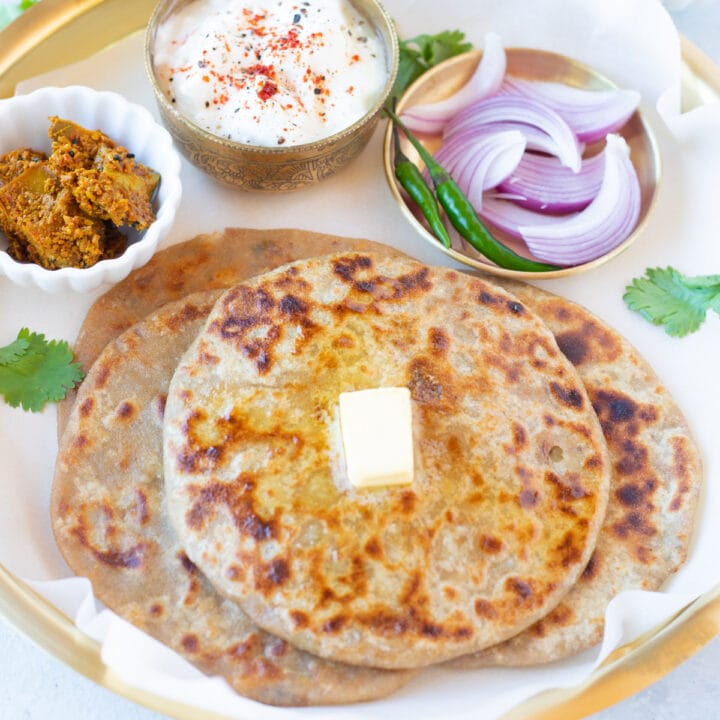
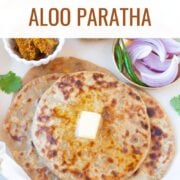
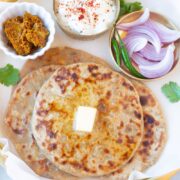
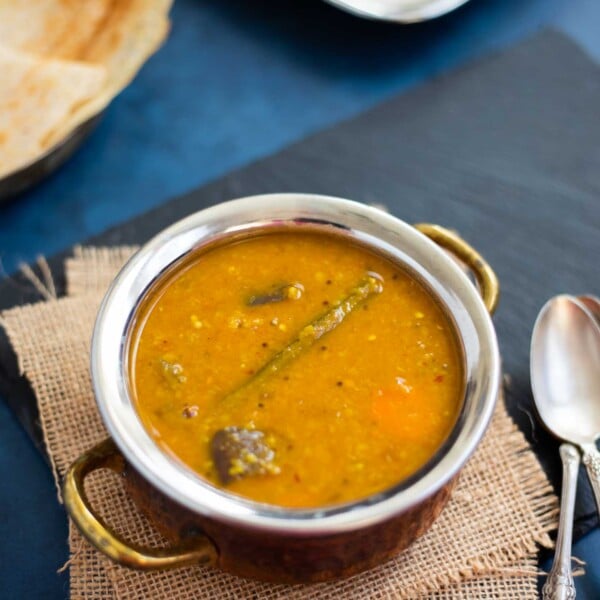
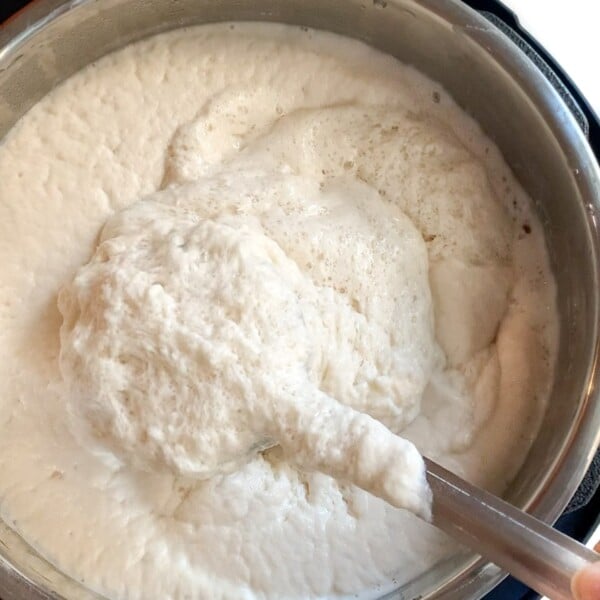
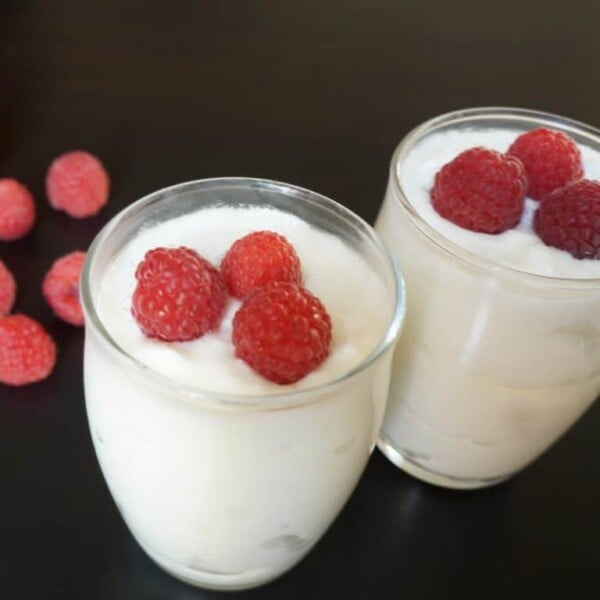
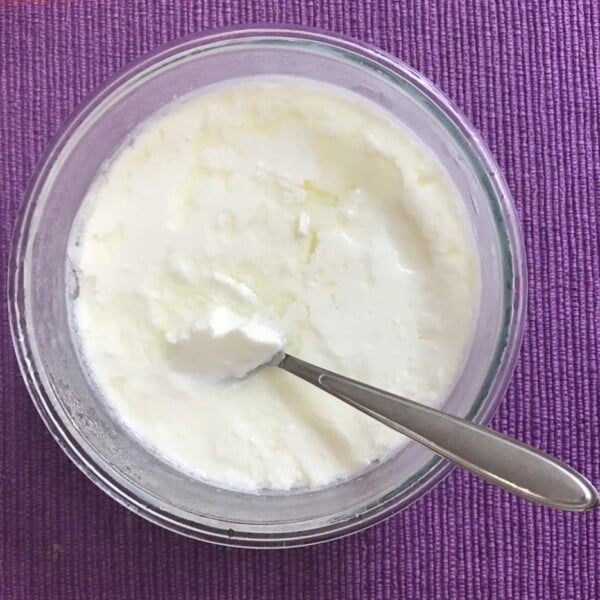








I tried this Aloo Paratha recipe for the first time, and it was absolutely amazing
Absolutely delicious and easier to make than I thought!!! I will definitely be making this again!!
Hi Tara, So great to hear that 🙂